#chechen-russian conflict
Text
Last week, civilians in Russia experienced something new—something Chechens, Georgians, Syrians, Ukrainians, and other civilians in the path of Russia’s military have known about for decades. After Russian tanks withdraw and shelling stops, Moscow holds certain hot spots in stasis. They become “gray zones”: neither at war nor fully at peace, wrecked by heavy artillery, psychologically traumatized and economically ruined, under Russia’s boot but subject to its neglect.
The gray zone has now come to the Russian side of the border with Ukraine. At 8 a.m. last Tuesday, dozens of Ukrainian tanks and armored vehicles broke across the frontier and entered the southwestern region of Kursk, where more than a million people live. In the Russian town of Sudzha, locals fled Ukrainian shelling, abandoning belongings in their burning homes. Thousands of residents lost electricity, running water, and cellphone coverage. The Ukrainians pushed deeper into Russia, reportedly controlling as much as 390 square miles of Russian territory within a week of the initial incursion. Russian authorities report that 121,000 people have been evacuated from 28 villages controlled by Ukrainian fighters.
Now, for the first time in many decades, a swath of Russia—including not only Kursk but other regions near Russia’s border with Ukraine, such as Rostov, Belgorod, Voronezh, and Krasnodar—could become a gray zone, a functional part of no country, controlled and punished by Russia’s adversary. And there is nothing like experiencing something for oneself to concentrate the mind.
“If there is a civil society in Russia, I hope they can see in real life what it feels like when you have no border left—it’s being demarcated by a foreign state right in front of their eyes, as it was in Ukraine in 2014,” Inna Varenytsa, a journalist and the mother of a 4-year-old boy whose father was killed outside Kyiv in 2022, told me. She said she hoped the intrusion would puncture the indifference of many Russians, “which would not make them feel empathy for Ukraine, but at least it will definitely make them think.”
Gennady Gudkov, a former member of Russia’s Parliament now in exile, also noted the impassivity among Russians. “First, Ukrainian Luhansk and Donetsk, now even Crimea and several Russian regions are turning into abandoned, ruined gray zones, and nobody in Moscow cares,” he told me. “They only think of their own profits and enrichment.”
Certainly, few in Russia have given a thought to the region of Abkhazia. In 1992, Russia fought the Republic of Georgia in a war that killed more than 10,000 people and displaced more than 200,000. When the fighting stopped, Russia swiftly recognized Abkhazia as independent and installed a base for its security services there. Abkhazia became a gray zone: Gudkov traveled to the area in 2001 and found it economically depressed and physically devastated. “My job was to visit these regions in the Caucasus where Russian citizens lived and voted,” he told me. “I saw minefield signs, abandoned armored vehicles, and sandbags.”
Not much had changed 13 years after Gudkov’s visit, when I reported from Abkhazia for Newsweek. In Gagry, hungry dogs roamed abandoned parks littered with bullet cartridges. Once-graceful old buildings moldered in ruins, and local athletes, artists, and ballet dancers complained that their republic, which they had dubbed Apsna, or the Land of Soul, was like Russia’s unwanted child.
Russia had recognized South Ossetia, too, as independent in the aftermath of the same Russo-Georgian war. And South Ossetia was likewise a gray zone, where life was poor, pinched, and cold. Not a single hotel was operational during the week I visited the region’s capital, Tskhinvali, in 2012, so I stayed in a private home, where my elderly landlady kept water boiling in big pots on the stove day and night just to heat her small house. The average income in her neighborhood was less than $300 a month. South Ossetia had held a presidential election the year before, but the winner, Alla Dzhioyeva, was kept under arrest in a local hospital, where I saw gunmen pacing up and down the hallway of her ward.
Russia maintains military and security forces in Abkhazia, South Ossetia, and Transnistria (another internationally unrecognized territory, this one in Moldova). But it does not care to reconstruct or breathe economic life into these regions. Their indeterminate status also isolates them internationally—years go by, and still none of these territories can issue travel or citizenship documents that would be considered valid abroad—and the sanctions on Russia complicate residents’ financial transactions with almost any bank in the world.
In 2014, Russia annexed Crimea and occupied the eastern Ukrainian regions of Donetsk and Luhansk, landing more than 4 million Ukrainian citizens in additional gray zones. Particularly in Donetsk and Luhansk, the fighting never stopped, and in all three territories, civilians have lived under harsh conditions for the past decade. Anton Naumlyuk, the editor and founder of Graty, a Ukrainian media group focusing on law and justice, told me that Crimea’s security services abduct and torture detainees in a manner “sometimes even worse than in the Northern Caucasus.”
Now the gray zone, a signature legacy of Russian wars, may have come home to Russia. Since last week, Russians, rather than Ukrainians, have taken to social media and blogs to wonder whether the nuclear plant nearest the combat area is safe, to watch videos of their young conscript soldiers taken prisoner and civilians stripped of shelter as the Kursk region disappears behind an active front line. The residents in these border regions can look forward to the same conditions that prevail in other gray zones: intermittent utilities, cash machines empty of money, communications gone dark, no investment that would allow them to rebuild. For those who had to leave the region, President Vladimir Putin has promised a onetime payment of 10,000 rubles, or $111.
Naumlyuk has seen this story unfold before.“For as long as the war goes on, the regions along the border will be abandoned,” he said, “and the population will remain in the gray zone, deprived of rights and compensated with miserable pennies.”
#current events#history#military history#politics#russian politics#chechen-russian conflict#first chechen war#second chechen war#russo-georgian war#syrian civil war#russo-ukrainian war#annexation of crimea by the russian federation#2022 russian invasion of ukraine#russia#ukraine#georgia#syria#abkhazia#south ossetia#donetsk people's republic#luhansk people's republic#kursk oblast#kursk#vladimir putin
2 notes
·
View notes
Text
.
#starting catholicism discourse by saying the pope shouldve shut the fuck up about minorities being the ''cruelest'' russians#''buryats and chechens'' oh you mean the ones being disproportionally thrown into the meat grinder#who are the ones who started this whole mess? the guys who were colonized surely#anyone who's lived through ANY sort of ethnopolitical conflict can tell you that religion has nothing to do with how ''cruel'' one is#also die#*gets excommunicated*
6 notes
·
View notes
Text
In a small corner of the disintegrating Soviet Union, a young Shakespearean actor named Akhmed Zakayev stepped off the stage and took up arms.
Zakayev, like many Chechens, had been hopeful when the USSR collapsed. A new state had been declared in the capital of Grozny almost immediately, inspired by the massive and peaceful popular uprisings across the ex-Soviet satellite states: the Chechen Republic of Ichkeria.
But Moscow wasn’t keen to lose any more territory. In 1994, tanks rolled Grozny and asserted that the republic was no more: Chechnya was a member of the new Russian Federation. That’s when Zakayev joined the resistance.
Thirty years later, Zakayev is the prime minister of the Chechen Republic of Ichkeria’s government-in-exile.
“I couldn’t have imagined that my fate would become what it is today,” Zakayev told Foreign Policy during an interview in Kyiv this spring. “We’ve experienced a lot of tragedy, a lot of bloodshed, a lot of violence since 1994, when we became the victims of Russian aggression.”
For three decades, across two brutal wars waged against the Chechens, Zakayev has tried to convince the world to back his nation’s independence. He has not had much luck: Although the republic was once recognized by Georgia and Afghanistan, no nation currently explicitly recognizes its status as the government of Chechnya.
Today, many of Russia’s separatists, including Zakayev, see enormous opportunity in Ukraine’s struggle for self-defense against Moscow’s aggression. They have supported the resistance both in spirit and by joining Ukraine’s fight. This has led to an extraordinary partnership—not just with Kyiv, but also among the various dissidents hoping to be free from the Russian Federation.
Together, they believe they can bring about the end of President Vladimir Putin—and Russia itself.
The drab boardroom in which I met Zakayev, in Kyiv, is a fairly recent home for the Chechen separatists. On the table before us were the green, red, and white flag of the Republic of Ichkeria; the Ukrainian bicolor, and the European Union flag. Along the wall behind Zakayev were rows of portraits of past Chechen leaders—and the dates of their deaths, usually at Russia’s hands.
“The fact is that, for over 30 years, the world has simply been watching the Chechen tragedy,” Zakayev said. “They have simply been watching as we were being murdered, as we were being forced to leave the country, as we were being scattered across the world.”
Since the 1990s, the official U.S. position on the conflict has been simple: “We consider Chechnya a part of Russia.” That position only hardened when Washington began describing Chechnya’s paramilitary opposition to Russian rule as a movement that was affiliated with al Qaeda. Terror attacks committed against Russia in the name of the Chechen resistance have only made a change in U.S. policy more unlikely, even if serious doubts remain about the responsibility for some of those attacks.
Zakayev, who represents a more moderate wing of the Chechen resistance, has spent more than two decades since the end of the first phase of the Second Chechen War in exile, mostly in the United Kingdom. He has worked to avoid having his portrait added to the wall of martyrs.
In 2007, police at Scotland Yard warned Zakayev that he was high up on a Russian hit list. But he survived. And in 2022, as Russia launched its full-scale invasion of Ukraine, Zakayev decamped to Ukraine—“unquestionably the leader of the entire free world,” he said.
He sees plenty of parallels between their struggles. “Ukrainians have felt what it was like for us, back in 1994,” Zakayev said. “We were branded as terrorists, as Islamic extremists.”
Zakayev said that this view of the Chechens, fostered by Putin but accepted by the West, is a “great pity.” It has brought about a global view of the Chechen people as either Putin’s shock troops or as violent terrorists. These are views that Putin has relished, broadcasting images of Chechen fighters in an attempt to carry out psychological warfare in Ukraine and using Chechen contract killers to kill Russian liberals such as Boris Nemtsov. Since the start of Russia’s war in eastern Ukraine in 2014, Chechen fighters have been dispatched to fight across Ukraine.
“We are destroying this image by siding with Ukraine and by being here,” Zakayev said.
The Chechens’ support for Ukraine isn’t just symbolic. Chechen volunteers have also fought with the Ukrainians in the Donbas since 2014. Since the full-scale invasion in 2022, they have joined the Russian Legion and other militias of Russian citizens who are fighting alongside Ukraine. When he spoke to Foreign Policy in March, Zakayev’s soldiers were taking part in cross-border incursions into the Belgorod region, a precursor to Ukraine’s larger offensive in Kursk today.
“It’s a very important strategic step, of transferring the combat actions to the enemy’s territory, because it’s the first time in years that the Russians have finally felt what the war is,” Zakayev said. “Since World War II, Russia has waged a lot of wars, but they’ve never felt what a war is like on their own territory. Finally, they’re beginning to experience aid raid alarms, they’re beginning to experience explosions, and they’re starting to feel this war on their own territory.”
To that end, Zakayev no longer sees independence as a regional and isolated concern. In his eyes, independence for Chechnya—and Ukraine, Siberia, Dagestan, and other Russian subjects—can only be achieved through toppling the Russian state itself.
“Putin’s war, that he started in Ukraine, must end in Moscow,” Zakayev continued. “And the people who are going to end this war must be Russians.”
Earlier this year, a correspondent with Russian state broadcaster Channel One toured the trenches on the front lines, reviewing “trophies” taken from Ukrainian fighters killed in action. In the video, the correspondent holds up two patches removed from the fighters’ uniforms—one of which, he says, is the Canadian flag. He looks to the camera: “The presence of mercenaries in the ranks of the Ukrainian Armed Forces is no secret.”
The video prompted dozens of laughing face emojis when it was posted on Telegram by an account run by Free Ingria, a separatist movement in Russia’s Leningrad Oblast. The patch was not the Canadian red maple leaf at all, but the flag of Udmurtia, a republic in the Urals.
The Ingria separatists, who want independence for the historical Baltic region around the former imperial capital of St. Petersburg, and the Udmurtia separatists, who want an independent state in their region west of the Ural mountains, may be more than 800 miles apart, but they have recently made common cause.
It’s all thanks to Oleg Magaletsky.
Shortly after the full-scale invasion of Ukraine began, Magaletsky founded the Free Nations of Post-Russia Forum. Composed of two dozen regionalist movements from across the Russian Federation, including the Chechen Republic of Ichkeria, it has become the coordinating body for those hoping to dismantle Russia itself.
It is not the only game in town: The Lithuania-based Free Russia Forum, founded by Russian chess grandmaster and dissident Garry Kasparov, has aimed to become a think tank and philosophical hub for this post-imperial Russia.
Magaletsky’s group is much more hands-on.
“We need to be prepared for big changes—for the collapse,” Magaletsky told me, sitting in a pie shop in Kyiv.
Magaletsky is an unlikely champion for the cause of Russian secession—he’s a soft-spoken and personable Ukrainian restaurateur who was turned on to politics by the Euromaidan protests. Yet he has thrown himself into the work, and he’s moved quickly.
His forum has served as a hub to coordinate the exiled leaders of these independence movements, who, in turn, coordinate with their compatriots who are still in Russia. They’ve also held a series of summits to connect some of the leaders of Russia’s “captive nations” with academics, strategists, and government officials around the world.
When the Free Russia Forum brought some of its members to Washington for a series of talks at the Jamestown Foundation in March, they stressed just how much of Russia’s might comes from its imperial conquests: its access to the Black Sea, its natural resources, and even the fighters who feed its army.
“[There] has been a litany of trials and losses of lives, lands, resources, culture, and language, taken away by the empire,” Radjana Dugar-DePonte, the co-chair of the Buryad-Mongol Erkheten Democratic Movement, told the attendees. The Buryat people are wildly overrepresented in the death toll from the Russia-Ukraine war, as are other ethnic minorities.
When he had the opportunity, Pavel Mezerin enlisted to fight alongside the Ukrainian Armed Forces.
While Zakayev’s forces joined the fight early, more and more Russian dissidents in exile were signing up to fight with Ukraine. Magaletsky rattles off the component members of his forum and which unit they fight under. He said that some are with the Siberian Battalion, others serve with the Free Russia Legion, and others are fighting directly under the Ukrainian Armed Forces.
Mezerin, who hails from Ingria, joined the Siberian Battalion but soon grew disenchanted with the mission.
The Ukrainian leadership, he told Foreign Policy, “was not interested in forming full-fledged combat units from Russian citizens who would fight for the freedom of Russia.” They were more “political projects than actual military units,” he added. It was “a very sad experience” for Mezerin—he quit the battalion and channeled his energy through Free Ingria, of which he is a coordinator.
Mezerin told me that he perfectly understands that Ukraine’s priority is in recapturing its own territory. He has been watching afar as Ukraine has pulled off its extraordinary invasion of the Kursk region and is cheering on his former comrades. This time, however, the Ukrainians used their regular soldiers instead of Russian militias. “I sincerely envy the people of Kursk,” Mezerin said.
If it was his territory that had been “liberated” by Ukraine, he said, “of course, we would return there immediately. We would be busy organizing armed militias, armed detachments. Ingria would be free.” He dreams of Ukrainian forces continuing their march north to St. Petersburg.
But he knows that this is a fantasy. “Ukraine is not interested in these regions,” he said, recognizing that they would almost certainly be traded for Ukrainian territory in any peace talks. “Ukraine is interested in its own freedom.”
The quest for independence falls on the shoulders of activists such as Mezerin and Zakayev. And independence, Magaletsky said, cannot come from a think tank. That’s why the Free Nations of Post-Russia Forum is actively involved in helping dissidents inside Russia prepare for what comes next.
“We have public activities,” Magaletsky said cryptically. “And, of course, we have unpublic activities.”
While he was careful not to put too much stock in a single operation, Magaletsky said that anything that could dismantle the idea of a “single and indivisible” Russian state would ultimately help their cause. “It is not so much the actual operation of the Ukrainian army in the Kursk region, as the reaction of both the Kremlin and the ‘Russian people’ to it in general.”
To that end, his operation requires a diversity of tactics. “Not all movements have people who are fighting now on the front line,” Magaletsky added, before offering me some of his pie. Others, he said, have members who are still inside Russia, making plans and preparations for when things change.
“They’re preparing, not for a big war on the front line—they’re preparing for their cities fighting.”
Everyone involved said that the work is hard—and dangerous. The Free Nations of Post-Russia Forum was declared an “undesirable organization” by Moscow in 2023 and attacked as an alleged CIA front group by news outlets loyal to the Kremlin. Many of the forum’s members have faced FSB crackdowns for years, and their projects have been declared extremist organizations.
However, Magaletsky said that their work is critical. Although the West has long supported the idea of a democratic Russia, its leaders seem sure that a change at the top is all that is needed. Magaletsky disagrees: “Putin is the result,” he said. “The problem is the imperial, colonial, system of Russia.”
Kyiv is certainly sympathetic to that view. The Ukrainian Rada has recognized Chechnya as “temporarily occupied” by Russia, and it is contemplating full recognition for the independence movements for Tatarstan, Chechnya, and Bashkortostan.
The West, however, is far from any such recognition.
“We, here in Ukraine, remember, of course, the speech of [then-U.S. President] George [H.W.] Bush, the so-called ‘Chicken Kiev’ speech,” he said, referring to the president’s 1991 address to the legislature of the Ukrainian Soviet Socialist Republic, in which he warned against “suicidal nationalism” and declared that “freedom is not the same as independence.”
“Now, post-Russia chicken speeches are popular,” Magaletsky wrote to me recently. “We are trying to change that.” He will keep trying to win over converts in Western capitals. The forum held its next round of meetings in Vilnius, Lithuania, in June.
As Mezerin told me, there’s no room for fatalism. “I’m an opposition politician in exile, so I’m an optimist. Otherwise, I would have no reason to go on living.”
14 notes
·
View notes
Text
The Execution of Tatiana Usmanova:
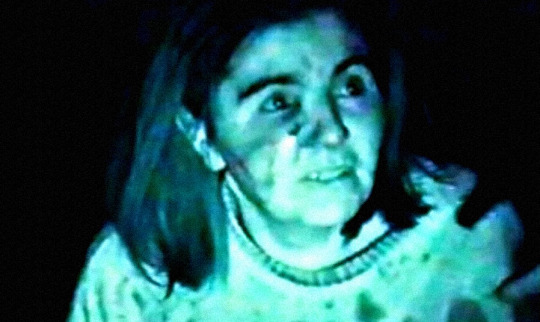
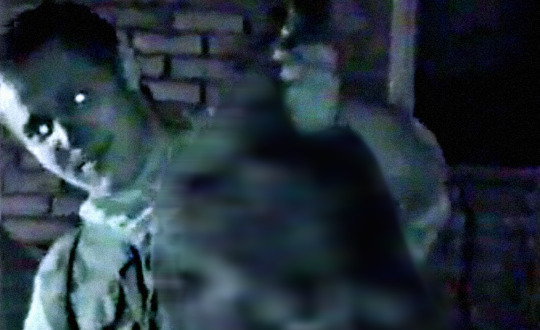
The Chechen Wars were a string of vicious conflicts between the Russian Federation and the Chechen Republic of Ichkeria. These brutal onslaughts transpired in two stages, from 1994 to 1996 (The First Chechen War) and 1999 to 2009 (The Second Chechen War), producing devastating consequences for the Russian Federation and the Chechen Republic of Ichkeria in terms of significant human suffering, including military and civilian casualties, civilian displacement, and eradicated infrastructure. From 1994 to 2003, as many as 50,000 to 250,000 civilians were killed in the combined Chechen wars, along with thousands more deaths of fighters from both sides.
The spread of technology during the Chechen wars allowed for the filming of various war crimes, and it became a breeding ground for atrocious propaganda footage, mainly by the Chechen rebels. These guerilla warfare-styled fighters employed psychological warfare to strike fear into the hearts of the Russians. One of the tactics they would utilize is recording the executions of captured Russian troops, then leaving the videotape on the body for the enemy to discover. A few of these videos were eventually uploaded on popular snuff hubs like Documenting Reality or Rotten and are considered the original gore videos available to watch online. One such video was the recorded murder of Tatiana Usmanova, which had vanished for some time before emerging on the internet once again.
32-year-old Tatiana Usmanova and her husband, Hassan Edilgireev, lived in the Adreevskaya Dolina village in the Zavodsky district of Grozny. On the evening of October 1st, 2001, Tatiana, Hassan, and her friend, Elena Petrovna Gaevskaya (reportedly paying a visit to the couple), were abducted by five pro-Chechan militants from their home. According to sources, the Chechen militants accused Tatiana of collaborating with local police or other agencies. Tatiana was murdered on camera in front of Hassan, while Elena was shot to death off camera. Hassan was tortured by the rebels; however, they allowed him to live because he was of Chechen descent. All of the killers, except for the cameraman, were around 18 years of age. Tatiana's execution footage was not released to the public until 2004, after the Grozny police obtained the tape, initiating a separate investigation into who was responsible for Tatiana's murder. While everyone who participated was eventually identified, most were already dead.
The killers were identified as:
Islam Chalayev: Killed during an FSB mission in April 2002
Khamzat Tazabaev: Killed during an FSB mission in February 2004
Adlan Barayev: Killed during a special operation in 2004
Arbi Khaskhanov: Official status is unknown (may still be alive)
Ilyas Dashaev: Already serving time in prison for past crimes
Sources cite that Ilyas Dashaev was part of the group led by Arbi Barayev, a Chechen warlord who had been explicitly selecting young and ruthless men to join. Dashaev then moved to a different group led by Islam Chalayev at the beginning of 2001. In January 2002, federal troops launched an operation against Dashaev and detained him. By December of that year, the Stavropol Regional Court found him guilty of murdering the heads of administrations for several Chechen villages, and two employees of the Urus-Martanovsky District Department of Internal Affairs, as well as banditry and robbery, earning him a sentence of 20 years in a maximum security penal colony. Finally, in 2007, Ilyas Dashaev was convicted by the Supreme Court of the Chechen Republic of the 2001 murders of Tatiana Usmanova and Elena Petrovna Gaevskaya and was sentenced to an additional 22 years. According to Dashnaev's court testimony, he confessed to brutalizing Tatiana and Elena for talking to authorities and dumping their bodies into a river.
Tatiana's Execution Video:
The footage of Tatiana's execution is 17 minutes and 55 seconds long, and it appears the cameraman recorded with a night vision filter inside a dark basement. Upon starting the video, you see a beaten Tatiana sitting on the dirt floor alongside Hassan, and she's interrogated for the first two minutes, occasionally being hit with a flexible rod. Despite the abuse, Tatiana appeared remarkably composed during the interrogation by the rebels.
From 2:30 to 3:50, one of the captors is seen digging a shallow pit for blood to flow in. The camera interchangeably zooms on Tatiana, and the expression on her face is of pure despondency as it seems there is no way out for her. Around 4:58, she began to panic, pleading for her life while they bound her hands together with tape. The video then cuts to Hassan having tape placed over his mouth before shifting back to Tatiana, who is on the ground with her mouth taped.
One of the rebels presses a combat knife onto her throat, not cutting it, but to practice where to cut. At 6:25, one of the rebels cuts the tape off Tatiana's mouth, and she begins murmuring to them, but what was said is not known. From 8:30 to 9:20, Tatiana has her mouth taped again as the rebels prepare for the killing.
By 9:20, the militants place Tatiana on her side by the hole. One holds her head back to expose her neck, while the other begins to sever her throat. A faint squeal leaves Tatiana's mouth as her throat is carved wide open, and her blood is seen streaming into the hole. The killers also took turns lacerating and holding her down against the dirt until she's finally decapitated. At 9:49, the footage cuts to a black screen, but you can hear the rebels talk amongst each other for about a minute or so before it cuts to Hassan at 11:06.
Hassan's head was covered in lumps and lacerations, indicating that the killers badly beat him. At 11:26, the cameraman walks around Tatiana's beheaded corpse as he laughs. One of the killers can be seen at 12:04 boasting with Tatiana's head in his hand before placing it on the floor. The remaining minutes of the footage show the killers probing Hassan, who appears to be in shock due to what he had witnessed happen to his wife, and then the video concludes.
#tatiana usmanova#chechen wars#morbid curiosities#true crime#true crime research#true crime community#beheaded#execution#second chechen war#wrathzy
68 notes
·
View notes
Photo
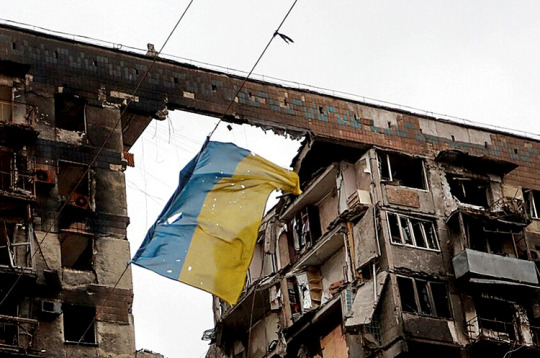
The date of 24 February is a terrible date for every Ukrainian and every decent person. Today is the anniversary of a full-scale invasion russia in Ukraine.
Many experts believed that russia would be able to capture Ukraine in a maximum of 10 days. But we were able to hold on. Now the Ukrainian are fighting for our freedom and independence.
Our ZSU give up their lives to protect othersю Unfortunately, the price of our freedom is too high. But the cost of defeat will be many times higher.
You can help Ukraine win this war.
How to help the Ukrainian army you can read here: Come Back Alive
And now...
In this publication, I want to remind the whole world what Ukraine experienced during the year of the bloody war. And I want to once again remind you the real face of the “russian peace” is destructions, fear and death.
Warning: This publication contains images and details readers might find distressing
In fact, this war began in 2014, when russia annexed Crimea and seized Donetsk and Luhansk regions. It is also true that russia planned military aggression against Ukraine in advance. Even if there had been no Revolution of Dignity (also known as the Maidan Revolution or the Ukrainian Revolution), putin would have found another excuse to invade Ukraine.
If you are interested in learning more about those events, you can check out this articles:
Conflict in Ukraine’s Donbas: A Visual Explainer
The invisible war: 8 years of battles in Donbas
10 facts you should know about russian military aggression against Ukraine
How the Revolution of Dignity changed Ukraine: Ten achievements
Revolution of Dignity (WIKI)
Of course, putin and his propaganda machine have always denied putin's aggressive actions towards Ukraine and other countries (for example the war in Abkhazia, the second Chechen war, the Transnistria conflict, the 2008 russo-Georgian war and so on).
Now Putin's propaganda machine is completely crazy and is talking fierce nonsense. So, in this there is absolutely nothing surprising. Do you know why? All because the propagandists hey more often than not repeat exactly what mr.asshole believes.
I recommend watching the putin's address to the Ukrainians before the start of a full-scale invasion on February 2022 [HERE].
Below are some quotes from the video:
“The Ukrainian army is waiting to get into NATO. … The West has explored the territory of Ukraine as a future theater, future battlefield, that is aimed against Russia.“
“Now, almost every day, they [Ukrainian military forces] are shelling settlements. They have amassed large troops. They are using vehicles and other heavy machinery. They are torturing people, children, women, elderly people. It does not stop. We have seen no end to it.”
It's an amazing mixture of bullshit and senile dementia. Thanks a lot to Michael Rossi Poli Sci for adding eng subtitles to this video. This speech should be recorded in history. You can also read a wonderful article by Max Fischer, in which he analyzed this putin's speech:
Word by Word and Between the Lines: A Close Look at Putin’s Speech

Ukraine: civilian casualties
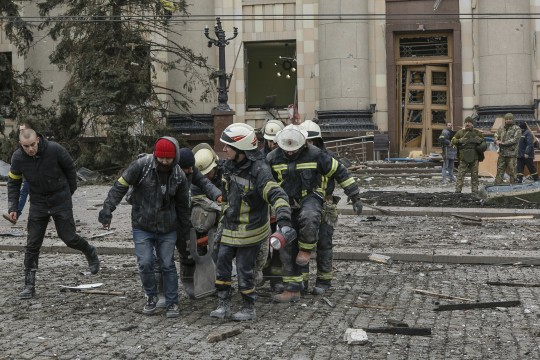
Since the beginning of the full-scale invasion, the actions of the russian occupants have resulted in the death of at least 8,006 Ukrainian civilians, and 13,287 injuries.
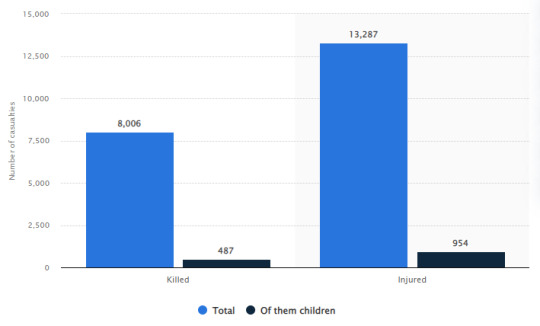
[Source 1]
[Source 2]
[Source 3]
P.S. It is impossible to establish the exact number of injured due to active hostilities and the temporary occupation of part of the territory of Ukraine
Ukraine: Children of war
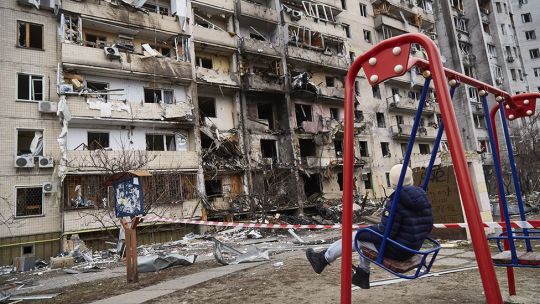
At least 461 children have been killed and 927 children have been wounded by the russian army forces since the beginning of the war.

[Source]
P.S. It is impossible to establish the exact number of injured children due to active hostilities and the temporary occupation of part of the territory of Ukraine
Ukrainian refugees
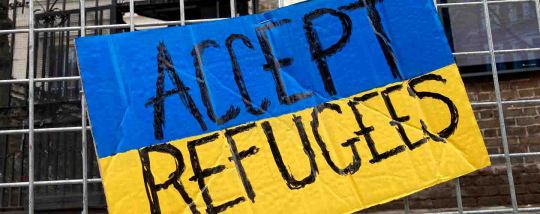
Headline statistics. The UNHCR records 8,087,952 refugees from Ukraine across Europe as of 20 February 2023. This amounts to around 20% of the Ukrainian population (estimated by Eurostat as at 2021).
4,863,513 refugees have registered for temporary protection in Europe.
The number of people who fled Ukraine since February 24 is estimated at 18,843,973, while 10,438,840 have returned to the country since February 28.
90% of Ukrainian refugees are women and children, while most Ukrainian men age 18 to 60 are banned from leaving the country
The vast majority of refugees initially entered neighbouring countries to the west of Ukraine (Poland, Slovakia, Hungary, Romania, and Moldova). Around 3 million people then moved further west to other European countries.
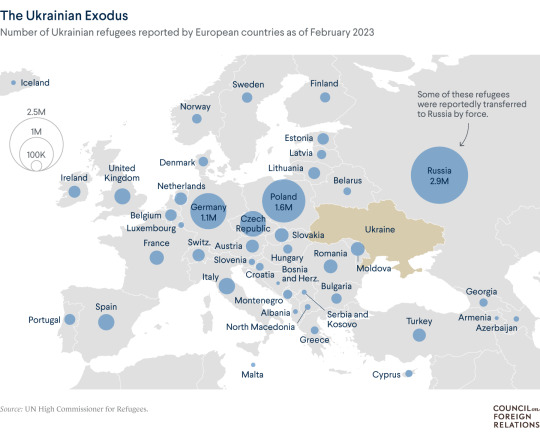
[Source 1]
[Source 2]
[Source 3]
[Source 4]

- The biggest tragedies of the war -
9 March 2022 - Mariupol hospital airstrike
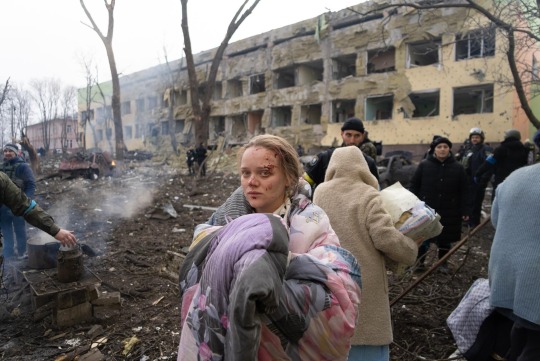
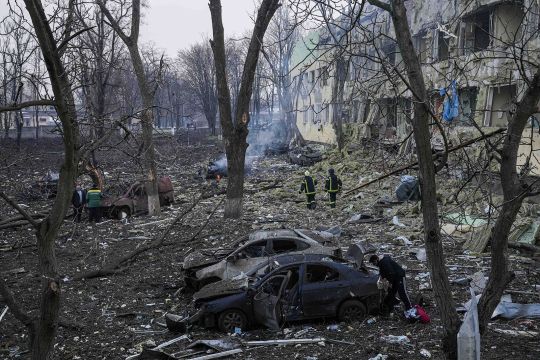
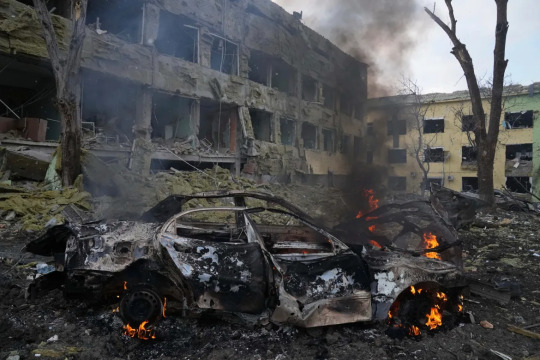
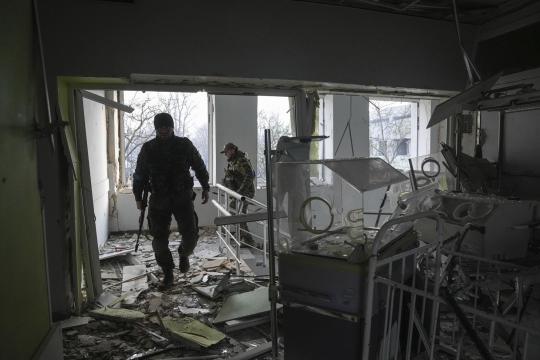
At least 5 people were killed and at least 16 were wounded during the airstrike. A pregnant woman and her baby have died next day after russia bombed the maternity hospital
16 March 2022 - Mariupol theatre airstrike
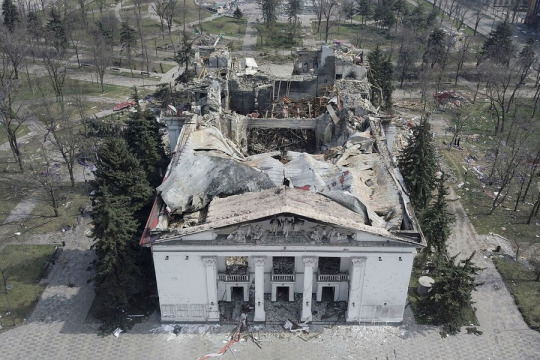
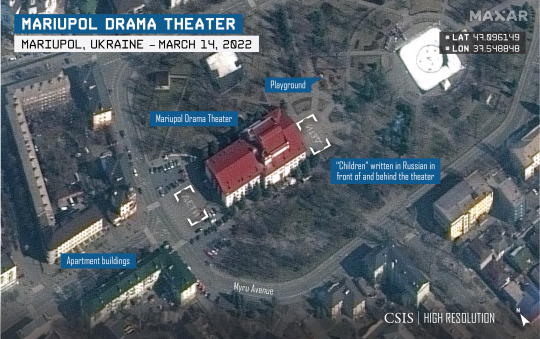
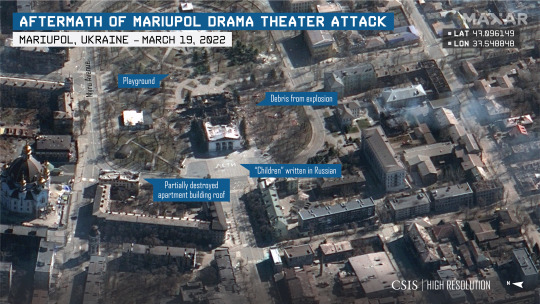
The russian armed forces bombed the Donetsk Academic Regional Drama Theatre in Mariupol, Ukraine. It was used as an air raid shelter during the siege of Mariupol, sheltering a large number of civilians. Associated Press reported that around 600 civilians were killed in the Russian airstrike both inside and outside the theatre building.
2 April 2022 - The Bucha massacre
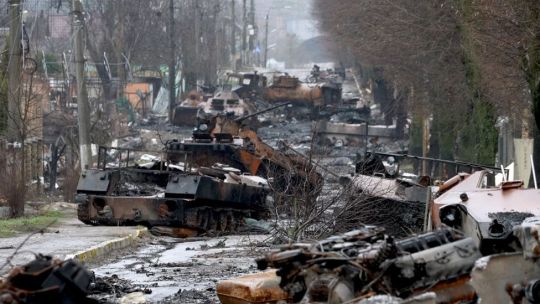
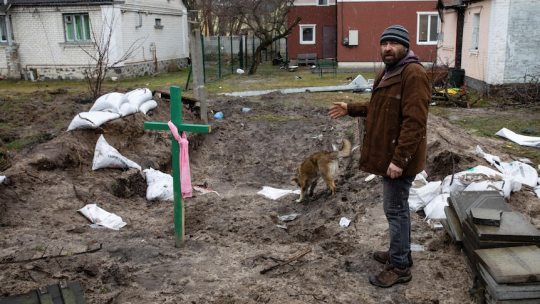
Photographic and video evidence of the massacre emerged on 1-2April 2022 after russian forces withdrew from the city
More than 650 were shot dead by russian soldiers. As of 13 June 2022, Ukrainian authorities said that 1,316 bodies had been uncovered in Kyiv Oblast including Bucha since the Russian withdrawal. The same day seven more victims were also recovered from a forest grave.
According to the mayor of Bucha Anatoly Fedoruk, just in the first day after Bucha was liberated, local authorities collected 280 bodies and buried them in mass graves. On March 12, it was reported that the citizens of Bucha buried 57 bodies in another mass grave, near a local church.
Below is a satellite image of the graves in Bucha (Supplied: Maxar Technologies/ABC)
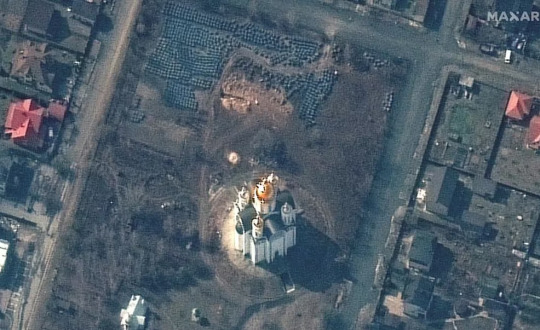
At least 20 bodies seen in one street in town near Kyiv. Many of the victims shot by the aggressors. Their hands were tied.
On 8 August 2022, officials released a count of civilian deaths in the town of Bucha alone: 458 bodies, 419 with signs of shooting, torture, or violent trauma, and 39 apparently of natural causes but being scrutinized for their relationship to the Russian occupation. 366 were male, 86 female, and five of indiscernible gender due to their condition. Nine were children. 50 bodies remained unidentified, along with body parts and ash
8 April 2022 - Kramatorsk railway station attack
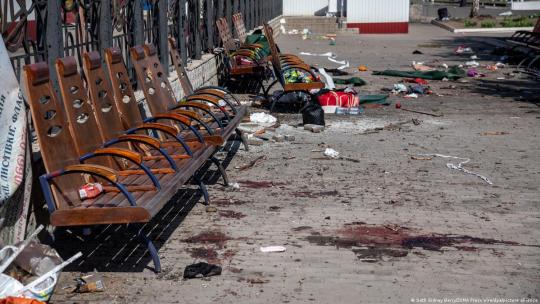
The strike killed 60 civilians (including seven children) and wounded more than 110.
27 June 2022 - Kremenchuk shopping mall attack
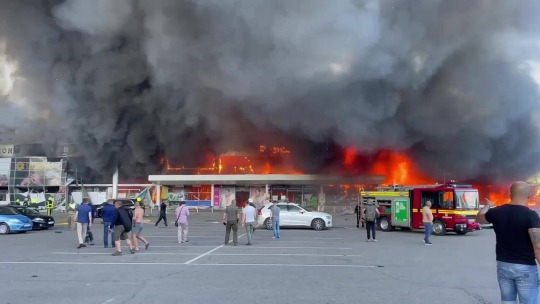
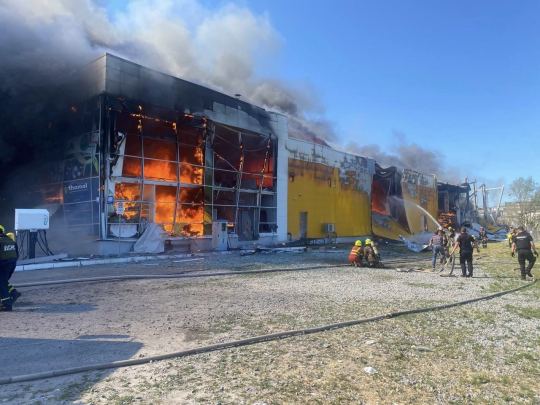
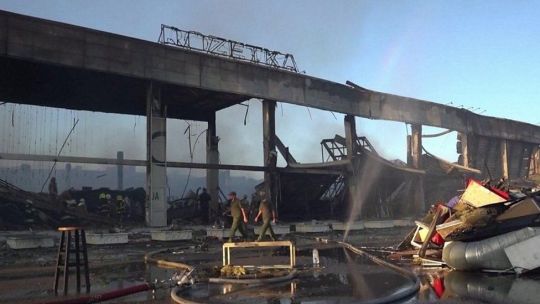
russian invaders launched a missile attack on a shopping and entertainment center in the city of Kremenchuk, Poltava region, where at that moment there were over 1,000 civilians.
A fire broke out and the attack killed at least 20 people and injured at least 56.
14 July 2022 - Vinnytsia missile strike
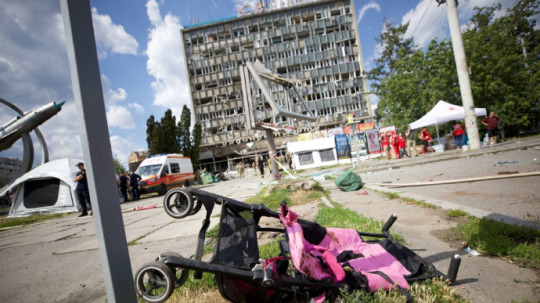
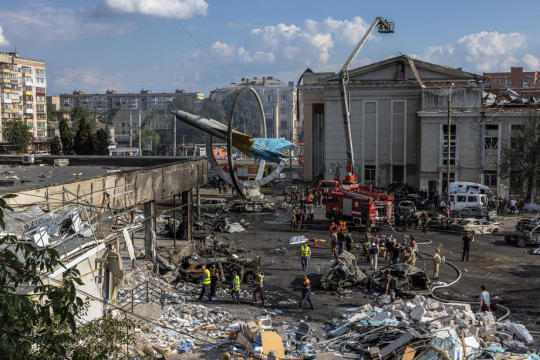
Russian missiles struck the city of Vinnytsia in central Ukraine, killing at least 23 people, including 3 children.
29 July 2022 - Olenivka prison massacre
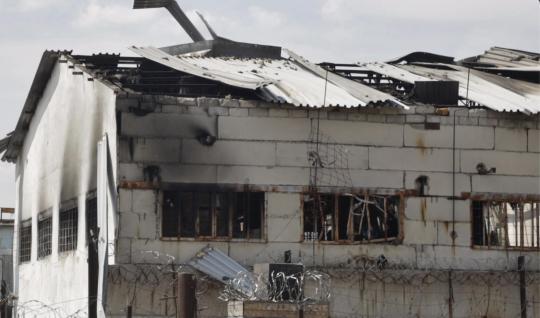
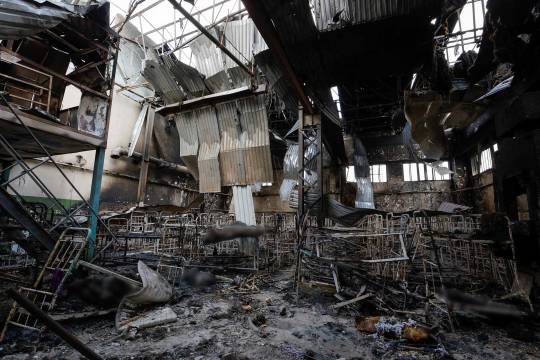
On 29 July 2022, during the Russian invasion of Ukraine, a building housing Ukrainian prisoners of war in a Russian-operated prison in Molodizhne near Olenivka, Donetsk Oblast, was destroyed, killing 53 Ukrainian prisoners of war (POWs) and leaving 75 wounded.
The prisoners were mainly soldiers from the Azovstal complex, the last Ukrainian stronghold in the siege of Mariupol.
10 September 2022 - Battle of Izium
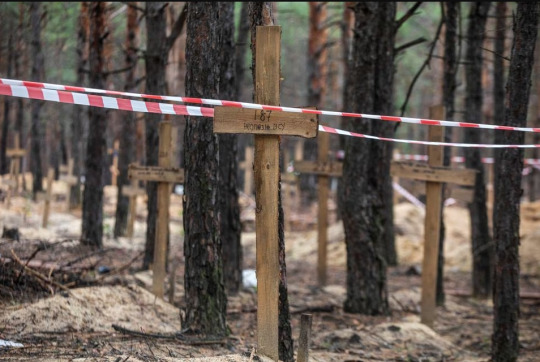
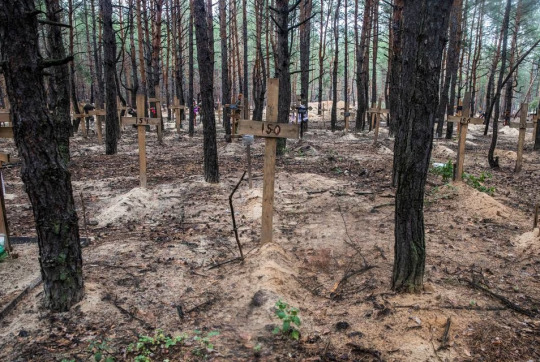
When Ukrainian forces recaptured the town during the 2022 Ukrainian Kharkiv counteroffensive and local mass graves with 440 bodies were found.
10 October 2022 - russian massive rocket strikes of Ukraine
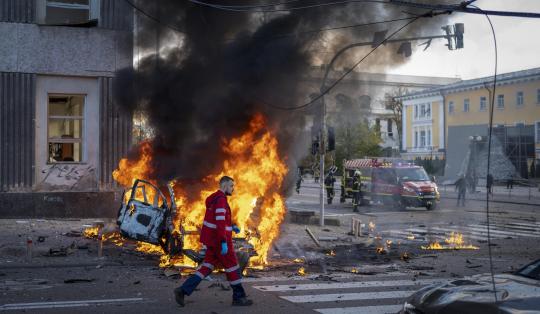
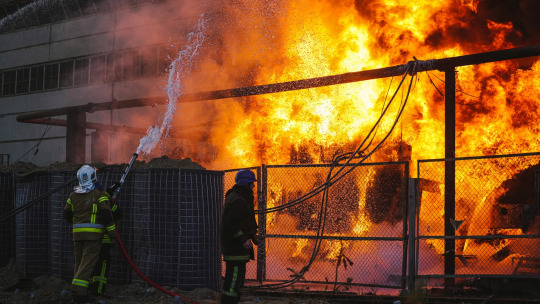
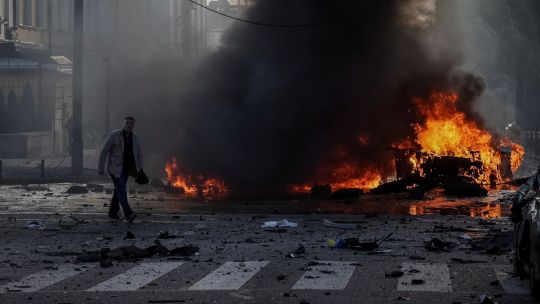
11 important infrastructure facilities in 8 regions including the city of Kyiv were damaged as a result of the strikes. Around 30% of the energy infrastructure in Ukraine had been hit by the missile attacks.
Russian missiles hit at least 14 regions of which the most intense were in Kyiv. Explosions were reported in Lviv, Ternopil and Zhytomyr in Western Ukraine; Kyiv, Dnipro and Kremenchuk in Central Ukraine; Zaporizhzhia in Southern Ukraine; and Kharkiv in Eastern Ukraine.
As a result of rocket strikes on energy facilities, many cities went into a blackout. Hot water also stopped running in apartment buildings.
At least 14 people have died and another 97 have been wounded as a result of russian massive rocket strikes.
14 January 2023 - Strike on residential building in Dnipro
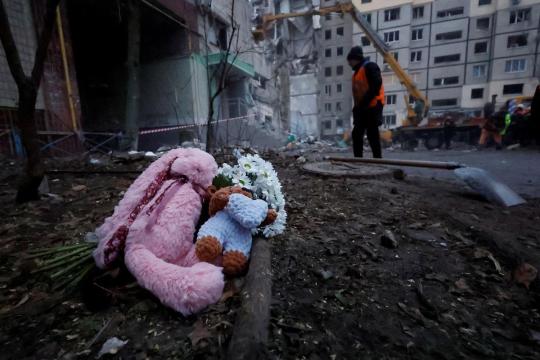
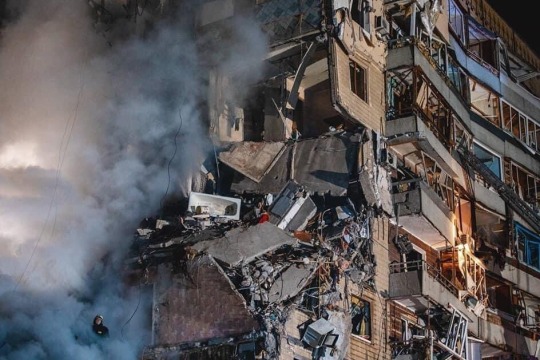
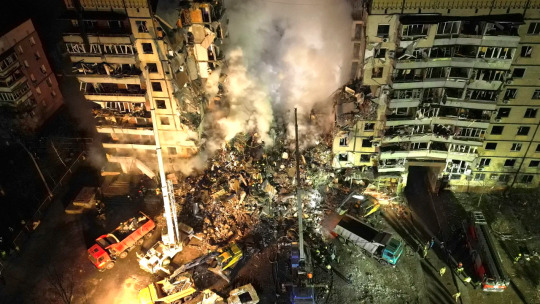

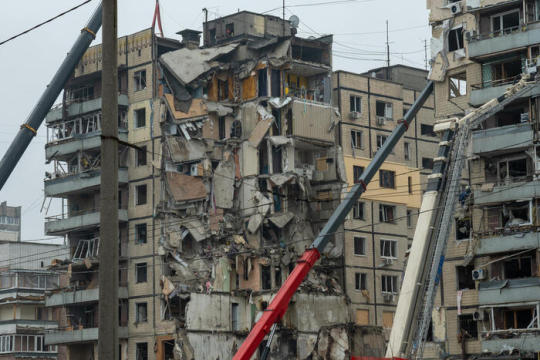
On 14 January 2023 at about 3:30 p.m., a Russian Kh-22 type missile hit Ukrainian nine-story residential building in Dnipro.
The missile strike killed 46 people and wounded nearly 80, among them 12 children
The strike destroyed 72 apartments and damaged another 230. The destruction left about 400 people homeless.

Above, I told you only about the most famous war crimes of Russia. But killings of Ukrainians and shelling of cities happening every day. Unemployment in my country is about 30%. Many cities and villages were razed to the ground. The lives of millions of my countrymen were destroyed.
This is what happens when a crazy dictator decides to conquer foreign lands. We must stop putin as soon as possible!
***
Слава Україні та слава ЗСУ!
Низький уклін усім українським захисникам, ви наші герої <3
57 notes
·
View notes
Text
[Article Published in 2006]
[Jamestown is a privately-funded US think-tank]
The Chechen factor is one of the controversial issues in the modern history of Azerbaijan. Since the first Russo-Chechen war, Azerbaijan did not pursue a consistent policy concerning the conflict in the North Caucasus. While officially the authorities denied any help to the Chechen mujahideen, various NGOs and private citizens were helping the Chechen cause. Azerbaijani hospitals were helping the Chechen resistance by treating wounded guerrillas. Even the late President Geidar Aliyev acknowledged that wounded Chechens were being treated in Baku hospitals, but denied that they were involved in terrorist activities. Azerbaijan was one of the destinations where Chechen refugees went to avoid atrocities and persecution.
Both the second Russo-Chechen war as well as Putin’s aggressive policy in the former Soviet space forced Azerbaijan to change its attitude and policy toward the conflict. The xenophobia against any Muslim resistance that followed the September 11 terrorist attacks in the United States led Azerbaijan to cut off almost [sic] all unofficial support to the Chechens. In the meantime, some the Chechen refugees started to trouble the Azerbaijani authorities. Between 2001-2003, the successful penetration of Salafi ideology became one of the main problems for Azerbaijan’s security agencies. Salafi missionaries [...] from Chechnya, Dagestan and Persian Gulf countries were actively penetrating Azerbaijan. Due to the fact that Azerbaijanis are predominantly (75-80 percent) Shi’a Muslims, Salafism did not find a broad base among the local population. The Chechen refugees, however, especially the youth, were very receptive to Salafi ideas.
[Article Published in 2000]
[Eurasianet receives funding from the NED, OSF, the FCDO, & others]
The Chechen war has placed Azerbaijan in an uncomfortable geopolitical position. Russia has repeatedly accused Azerbaijan of supporting Chechen separatists, and the Kremlin has pressured Baku, seeking Azerbaijani approval for Russian military policies. Though sympathetic to the Chechen cause, Azerbaijani leaders have denied the allegations, and have sought to defend the state's sovereignty and protect its oil export options.
In the latest diplomatic incident, Azerbaijani officials rejected a report that Chechen leader Aslan Maskhadov and other separatist fighters were using Azerbaijan as a safe haven, the Interfax news agency reported on August 21. "There is not a single Chechen rebel on the territory of Azerbaijan," said a statement issued by Azerbaijan's National Security Ministry. Such claims made by Russian military officials were the result of either "the fruit of a sickly imagination or poor professionalism," the ministry statement added.
In mid July, Russia and Azerbaijan sparred over the broadcast of an interview with [Top] Chechen rebel commander Shamil Basayev by a private television station in Baku. Azerbaijani officials, seeking to allay Russian concerns, initially tried to prevent the broadcast, but relented after a public outcry. The decision predictably produced outrage in the Kremlin.
[Official Statement from Artsakhi MOFA]
[Originally Published At Earliest 2006]
From 1992 to 1994, thousands of mercenaries, mostly Chechens and Afghans, were fighting on the side of Azerbaijan against Nagorno Karabakh.
Azerbaijan started building relations with Chechnya in the beginning of 1990s, when the leader of the “Popular Front of Azerbaijan” Abulfaz Elchibey visited Grozny, the capital of Chechnya, and established friendly ties with General Dzhokhar Dudayev2. In April 1992, the delegation of Muslim religious leaders of Azerbaijan visited Chechnya. According to several sources, representatives of the Ministry of Defence of Azerbaijan were also secretly included in the named delegation. Apart from the discussion of procedural matters (building relations between the two states and peoples, joining efforts aimed at Islamic revival etc.), the issue of military cooperation was also touched upon during the bilateral meetings. In particular, the possibility of participation of Chechen mercenaries in hostilities against Nagorno Karabakh was discussed in return for Azerbaijan’s consent to use its territory for arms supplies to Chechnya3.
The first group of Chechen mercenaries that arrived in Azerbaijan was headed by field commander Shamil Basayev, who later organized a series of violent terrorist attacks across Russian Federation and was included in the UN, US Department of State and European Union lists of designated terrorist actors.
By July 1992, there were already around 300 Chechen militants fighting against Karabakh as part of the Azerbaijani forces4. After several months of fighting against the NKR Defense Army most of the Chechen detachments, having suffered heavy losses and leaving behind captives, left the battle-fields and returned to Chechnya. At the same time, representatives of Chechnya arrived in Stepanakert to conduct negotiations aimed at releasing captive Chechen fighters, which resulted in an agreement to extradite the prisoners.
However, the cooperation between Azerbaijan and Chechnya did not end with that, rather it developed further, particularly in the field of arms trade.5 Azerbaijan became a transit country for supplying weapons and material aid to Chechen militants.6
The impunity of Azerbaijan's first attempt to use mercenaries inspired Azerbaijani authorities to engage new groups, this time from among Afghan militants.7
In the summer of 1993, when Azerbaijani army was suffering serious military setbacks on the Karabakh frontline, Baku turned to Afghan authorities for support; seeking to engage Afghan mujahideen in hostilities against Nagorno Karabakh self-defense forces.
In July 1993, Deputy Minister of the Interior of Azerbaijan Rovshan Javadov arrived in Kabul, the capital of Afghanistan, where he had a meeting with the Prime Minister of Afghanistan, the leader of the party “Hizb i Islami” (Islamic Party) Gulbuddin Hekmatyar to negotiate on sending Afghan militants to Azerbaijan.8
According to several sources, in different periods of 1993-1994, the number of Afghan mujahideen employed in Azerbaijani forces ranged from 1000 to 3000.9[...]
Along with Chechen and Afghan mercenaries, Turkish military advisers and militants of the Turkish nationalist organization “Grey Wolves” (Bozkurt) were fighting on the Azerbaijani side. Beyond the direct involvement of separate Turkish detachments in the hostilities on Karabakh battlefield, around 150 high-ranking officers of the Turkish Army, including 10 retired generals, actively participated in the planning of combat operations and training of subversive and assault units of the Azerbaijani Army in the beginning of 1992.10 During the entire war period, Turkey provided comprehensive military support to Azerbaijan both in terms of army building, and military and logistical supplies.
In military actions against Artsakh, mercenaries from CIS countries fought as part of the Azerbaijani forces as well, mainly reinforcing the crews of combat vehicles and machinery of the Azerbaijani Army.
Engagement of mercenaries, especially Chechen and Afghan militants, in combat actions in Karabakh, and also the fact that they settled down in Azerbaijan, eventually turned into a serious problem for Azerbaijani authorities. Some of them engaged in criminal affairs instead of participating in military actions or demanded very large remuneration for their participation in hostilities. Involvement of Afghan mujahideen in the conflict zone became the main factor making Azerbaijan a transit country for transportation of illegal drugs to Russia and Europe11 as well as a transit and provisioning point for terrorists and terrorist activities.12
[RFE/RL is US State Media]
[Article Published in 2020]
Mohammad Younas is nostalgic about his time fighting with Azerbaijani forces in the war against Armenians for the Nagorno-Karabakh territory in the early 1990s[...]
“My real motivation in going to Azerbaijan was participating in a jihad, but I also wanted to make some money,” he told RFE/RL's Radio Free Afghanistan.
Younas was among the thousands of Afghan fighters that Hezb-e Islami, a major Afghan Islamist party [founded by Gulbuddin Hekmatyar & funded by the CIA], sent to Azerbaijan in the 1990s to bolster Baku's war against Armenia. The conflict between the two Soviet republics mushroomed into a full-scale war after the fall of the Soviet Union in 1991, which preceded the demise of Afghanistan’s communist regime in April 1992.[...]
While far from being materially involved in the current war over Nagorno-Karabakh, Kabul still supports Baku’s position, which sees Yerevan as occupying its territory -- a position also recognized internationally.
Afghanistan’s declared support for Azerbaijan has prompted Armenia to push for an end to Kabul's observer status in the Collective Security Treaty Organization (CSTO), a Russia-led regional alliance.[...]
Hekmatyar still celebrates sending people like Younas and thousands more of his supporters to fight for Azerbaijan after it requested help. In a speech to his supporters last week, he said that in response to an Azerbaijani request he told Afghan refugees in Iran to join the fighting in Nagorno-Karabakh.
“A sizeable number of our mujahedin went there and scored numerous victories,” he told supporters at a Kabul mosque. “They pushed back the Armenians within the initial days and captured many territories. Their advances continued until the Azerbaijani officials approached us ahead of impending talks that resulted in a cease-fire,” he said, referring to an armistice in May 1994 that ended nearly six years of fighting over Nagorno-Karabakh.[...]
Upon his return to Afghanistan in June, Younas was paid more than $1,500 for his participation in the fighting by his party, which confirms speculation that Afghan fighters were recruited as mercenaries by Azerbaijan.[...]
[Hekmatyar’s son-in-law and a senior Hezb-e Islami leader] says Hezb-e Islami fighters ultimately contributed to forcing the Armenians to accept a cease-fire.
Beginning in late 1993, Armenian authorities protested the recruitment of Afghans by Azerbaijan.
17 notes
·
View notes
Text
Haven't seen it anywhere on here yet, but Žižek once again the only communist who is not a useful idiot for Russia.
Some highlights
Is Waters’ “truth” really an expression of neutrality? In an interview earlier this month with Berliner Zeitung, he said: “Maybe I shouldn’t be, but I am now more open to listen to what Putin actually says. According to independent voices I listen to, he governs carefully, making decisions on the grounds of a consensus in the Russian Federation government.”
As an independent voice who follows Russian media very closely, I am well acquainted with what Putin and his propagandists “actually say.” The major TV channels are full of commentators recommending that countries like Poland, Germany, or the United Kingdom be nuked. The Chechen warlord Ramzan Kadyrov, one of Putin’s closes allies, now openly calls for “the fight against Satanism [to] continue throughout Europe and, first of all, on the territory of Poland.”
“Neutral” countries outside the West contend that the war is a local conflict that pales in comparison to the horrors of colonialism or more recent events like the US occupation of Iraq. But this is an obvious dodge. After all, Russia’s imperialist war is itself an act of colonialism. Those who would claim neutrality forfeit their standing to complain about the horrors of colonization anywhere. Waters is a vocal exponent of the Palestinian resistance to Israeli colonization. Why is Ukrainian resistance to Russian colonization any less worthy of support?
Sometimes, things really are as simple as that, especially now that Russia is preparing to celebrate the anniversary of its war with a new offensive. It is obscene to blame Ukraine for Russian acts of destruction, or to mischaracterize the Ukrainians’ heroic resistance as a rejection of peace. Those, like Waters, who call for “an immediate ceasefire” would have Ukrainians respond to redoubled Russian aggression by abandoning their own self-defense. That is a formula not for peace, but for pacification.
37 notes
·
View notes
Text
"Putin was wrong to invade, but Europe and US should negotiate peace instead of fueling warmongering Zelenskyy" - this is the message I've been getting almost every day. So I decided to respond with a thread.
First of all, dear peacemakers, do you have a clue what are Putin’s demands for peace? I will tell you: Russia is allowed to invade and control Ukraine’s government, resources, and legislation for an indefinite time.
Ukraine’s army must be demilitarized and almost destroyed. This means leaving no weapons, and no means to respond to any future threat from Russia.
All damage Russia brought to Ukraine must be rebuilt by Ukrainians and Europeans.
All criminal accusations, all sanctions must be lifted. All crimes must stay unpunished. Territory, Russia took over by force, must stay under Russia no question. Russia does not agree to draw its forces out of Ukraine.
It still insists it is allowed to deport Ukrainians from their homeland and instead let Russians move in. Look at what is going on in Mariupol. This will be all of Ukraine.
At the same time each attack, each mass murder committed by Russians in Ukraine is blamed on Ukraine. Logic: Stop protecting yourselves, you are not allowed. We are allowed to shoot anti-ship missiles at your cities.
But it is you who’s guilty, bloody warmongers. Stop resisting. Let us turn you into the colony. Because we have the right, because we used to have you and want to have you back by force in 21st century.
Meanwhile, the ones, you call warmongers from EU and US: provide weapons on their own schedule, do not provide any means we can use to attack Russia or even Crimea. Strictly forbidden to use any of their weapons to bring war to Russia. Still are afraid of Russia losing
Agree to lift sanctions from Russian oligarchs, put Russian banks on Swift, buy Russian nuclear energy even at times Russians keep largest NPP in Europe hostage.
But let's think we agreed on Russia's peace terms after all it did to us. After it destroyed our cities, and industries, killed, raped, and kidnapped our people. Because "every war ends with negotiations", right?
NATO indeed got a boost because Russia attacked Ukraine. So they do have a plus. We got weapons to stand and retake our territory. Also a plus. But let's go into the "negotiations camp". Imagine this war ends on Russian terms, and that's the terms Russia agrees to negotiate.
What message do we send to the world: If you are a bigger power that wants to colonize neighboring countries, you can do it. You can come and kill the natives, destroy their houses, kidnap their kids, and turn them into your new citizens to replace those killed in war.
You can send natives to filtration camps, take away their property and send your own people from depressive regions to live in better conditions in the colonized country. and that is fine. You will still be at UN, still will be doing business as usual.
You might suffer from sanctions for a while, but you can always use loopholes or kill even more natives to pressure the world to lift the sanctions and let you continue your war. it will work. You will consolidate power at home, showing how strong you are.
You will use mindblowing propaganda efforts, mixing historical conflicts to get allies in modern times, making people previously colonized by others that now the sovereign state you still see as your breakaway colony, is somehow guilty for this war.
You dare to blame Ukraine, the West for this war, but not the one who actually has boots on the ground. not the one who destroys food destined maybe for your countries. This all because when you were suffering, nobody helped you. now you think it is fair for this to continue.
and the most mindblowing thing here is that if Putin's peace will happen, you will all remember us, like we now remember Syrians, Georgians, Chechens, and Afghanistan. World ignored all warnings, and kept business as usual, while one by one Russia was destroying us.
Now Putin, feeling the Ukraine fatigue and upcoming election year moods shits, feels blood and already reminds Poland that Stalin presented her lands. WEAK UP!!!!
The ones, who strip us of agency, because we need help fighting on our own with the largest army on the continent, please get a life. Read history. read about Ukraine. We have free and fair elections, even now there are openly pro-Russian lawmakers in parliament.
Yes, during the war we got a bit less democratic, but as did ANY OTHER COUNTRY during the war in history.
Our parliament still has heated debates about laws, we got rather strong institutions. We are older than Russia, we just had different names, like most of the countries in their history. Please read, and educate yourselves more. don't just write "independent thinker" in your bio
if you think that just letting Russia win will end this and it will be good, you should stop also in your daily life: standing for yourself or your loved one when someone's abusing him or her. Let bully at school to abuse your kid, and ask your kid what did he do to provoke it?
Stop writing quotes of great leaders about justice in your bios. Because you clearly are not ready to fight for justice, so be truthful. Write something about surrendering for the sake of peace. be honest to yourself. END.
Me, and many others like me probably will not survive to live in the new world, where surrendering to an aggressor who's murdering is right, cause you might get the chance that not all of you will be murdered, some might be enslaved and live happily ever after.
And honestly, I start thinking it is fine that I might not survive to live in this new "wonderful" world our place will turn if Russia is not defeated in Ukraine.
-- by Nika Melkozerova
Source
#ukraine#russia#peaceniks#vatniks#appeasement#politics#twitter thread unroll#eastern europe#imperialism
14 notes
·
View notes
Text
one of the things that visiyta will never understand about english is how they have one word to refer to an ethnicity, a country, and a citizen of said country. because that's not how it is in russian, there's a different word to refer to ethnic russians, the russian state, and a russian citizen. this causes a fair amount of conflict because people tend to call him 'russian' and he's not, visiyta is ethnically chechen and depending on which version I write he either is or is not still a russian citizen.
pretty much it boils down to a conflict in how visiyta refers to himself (he calls himself chechen, technically is a russian citizen but doesn't claim it proudly) against how other people refer to him in their languages. it also doesn't help that in the west in general chechnya and chechens themselves aren't really known, so people don't necessarily know to address him as such before he practically yells at them.
#⡇⡇⡇ ⸻ 𝐬𝐡𝐚𝐝𝐞𝐬 𝐨𝐟 𝐠𝐫𝐞𝐞𝐧 ( musing )#language is so cool so pardon me nerding out about it#but to visiyta if you call yourself like “English” or “German” he's assuming you mean that's your ethnicity#look his English isn't great so we're not going to talk about his understanding or lack there of when it comes to English grammar
2 notes
·
View notes
Text
I fled Putin’s Russia for Canada. It opened my eyes.
Canada showed me the importance of Indigenous rights. Now I want the same for Indigenous people in Russia.
Nikolay ZyuzevJanuary 3, 2023
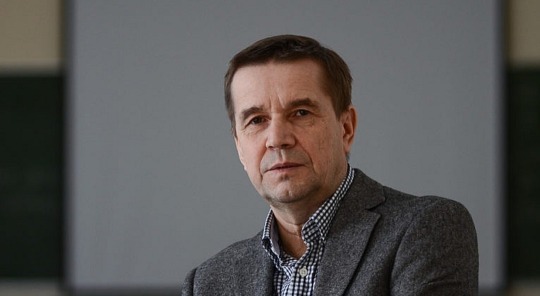
Inspired by Canada's reckoning with its colonial past, Nikola Zyuzev is developing projects to support Russia's Indigenous communities targeted by the Putin regime (Photo courtesy semnasem.org)
I decided to leave Vladimir Putin’s Russia—the first time—in 2006. And though it’s almost impossible to imagine now, people at home and around the world that year were applauding the Russian president’s successes. Russia had just hosted a G8 summit and signed a deal with the U.S. which eventually allowed it to join the World Trade Organization. Oil and gas profits were up, the economy was booming and Russians were enjoying middle-class luxuries—cafés, restaurants, vacations—that people in the West take for granted.
But as a social and political philosopher, it’s my job to look beyond the glittery surface, and it wasn’t hard to see signs of rot. Russia’s state-controlled gas monopoly, Gazprom, had cut off supplies to Ukraine over price disagreements, demonstrating the Kremlin’s willingness to use energy as a geopolitical weapon. Tensions with Georgia were rising as the former Soviet Republic butted heads with Putin by developing closer ties with the West.
And Putin and his supporters were growing bolder and less tolerant of dissent at home. In October, the brutal assassination of journalist Anna Politkovskaya was a chilling warning to whose who dared to criticize the regime. Politkovskaya had become famous for criticism of Putin, and for her sympathetic reporting from Chechnya, which during the Soviet era had existed as an autonomous ethnic republic within the Soviet Union. After the fall of the USSR, Chechens demanded their freedom, sparking years of brutal conflict with Russia.
Politkovskaya’s murder was a warning to dissidents, and the crushing of the Chechen uprising was a warning to members of Russia’s Indigenous and ethnic minorities. I was both. I’m from the Komi minority, a Finno-Ugric people whose own republic, with a population of nearly one million, lies 1,000 kilometres northwest of Moscow. The Komi people have a distinct language and culture dating back at least two millennia, but under Putin’s rule, we face cultural and linguistic extinction. Like all of Russia’s nearly two dozen republics and four autonomous districts, the Komi Republic is supposed to have some degree of autonomy; in practice, it has none.
I didn’t want to live in a nation tumbling headlong toward fascism—and I definitely didn’t want my daughter growing up in one. I applied to Canada for permanent residency, and in July 2009, I left for Toronto. In 2015, I became a Canadian citizen.
During those years, I watched from a distance as all my worst fears about my homeland materialized. Just months before I left Russia, a radical priest named Kirill—a Putin ally—became patriarch of the Russian Orthodox Church. Likely under Putin’s orders, he began delivering sermons glorifying the “Russian World,” an idealized ethnic Russian homeland populated by true Christians fighting an onslaught of Western decadence. It goes without saying that this worldview left no room for communities like mine to exist with any degree of self-determination—instead, they were to be assimilated into Putin’s monolithic vision of Russia.
In Canada, these developments hit unusually close to my new home. When I arrived, Canada was struggling with its own relationship to its colonial past, and the crimes committed against Indigenous people in this country. The Truth and Reconciliation Commission was hard at work investigating the residential school system, which bore striking similarities to an attempt in Russia to erase the Nenets people in the country’s far north between the 1950s and 1970s: children were forcibly removed from their families to be “re-educated” in Soviet schools, where they were abused and many died. Russians don’t talk about that past anymore—any mention of it would almost certainly mean imprisonment. Canada, by contrast, had struck up a national conversation about redressing these evils, and I was amazed by the willingness of so many Canadians to confront this dark past with honesty.
My experiences in Canada planted a seed. Would it be possible for ethnic Russians to wake up to their imperialist past and own up to the damage done to Indigenous peoples who lived on the lands they now occupied? Was reconciliation possible within the so-called Russian World? It if was, could I help make it happen?
In 2015, I was asked to lead a new research centreat the Pitirim Sorokin Syktyvkar State University—right in my hometown of Syktyvkar, the capital of the Komi Republic.
How could I say no? My daughter had grown into a remarkable teenager who excelled in her new Canadian life, but my marriage had unravelled, and I was having no luck breaking into Canada’s tough academic job market. Despite my reservations about what was happening in Russia, I couldn’t pass up a chance get back into the classroom with students and reinvigorate my scholarly career. The research centre’s mandate involved forging new relationships with scholars in Europe, North America and elsewhere. It felt like a way to push back against Putin’s parochial vision of Russia’s future.
But soon after arriving back in Russia in July 2015I realized just how unbearable things had become—and it was the attitude to Indigenous and other ethnic communities that was most disturbing. Rather than moving closer to the Canadian model of engagement and conversation that had inspired such optimism in me, things had gone in the opposite direction. People accepted official propaganda almost unquestioningly. Most cheered on Russia’s 2014 annexation of Crimea, in southern Ukraine, as a legitimate exercise of power, to bring back to Russia what belonged to it. And animosity toward the Western world had grown—increasingly, people were convinced that the West wanted to destroy Russia. It was impossible to debate any of these claims; even university colleagues would simply claim I’d been “fooled” by American propaganda.
The idea of making an impact as a scholar looked remote. I still found solace in the classroom—most of my students were immune to official propaganda and interested in my firsthand experience in the west. They were my main moral support throughout that seven-year stint in Syktyvkar. But the oppressive weight of Putin’s Potemkin nation eventually became too much to bear.
So in the fall of 2021, I approached two friends—one a sociologist and retired politician, the other a linguist studying the Komi language—and brought to them a radical new idea: to establish an online Finno-Ugric University. It would offer high-quality social sciences education to Komi youth, help them think more critically and, importantly, raise awareness about the injustices suffered by the Komi people.

Courtesy semnasem.org
While we were trying to find funding, Leonid Zilberg, a Jewish businessman and advocate of minority rights in Russia, suggested that we collaborate with his online magazine, 7×7, and expand the project to include all of Russia’s minority groups. Zilberg had fought against rising antisemitism for years in Russia, and he founded 7×7in 2010 to tell the stories of Russia’s minorities.
Our project got an extra boost of urgency after the invasion of Ukraine last year. Leonid and his staff at 7×7were forced to relocate to Vilnius, the Lithuanian capital, after Putin announced a new law punishing anyone who questioned the war with up to 15 years in jail. It was already obvious to me and my colleagues that launching the project inside Russia was impossible—we’d never get a licence for it, and if by some miracle we did, we would instantly be labelled a “separatist” organization and jailed.
Putin’s newest crackdowns made it even more obvious that self-imposed exile was the only option, so in May of 2022, I boarded a flight to Istanbul, one of the few cities still accepting air travel from Russia. From there I headed to Vilnius, joining Leonid and his team.
Since then, Leonid and I have been travelling throughout Europe raising awareness—and money—for what we’re tentatively calling the Indigenous Russia Information and Education Center. We sense an opportunity in the aftermath of Putin’s disastrous invasion of Ukraine: Indigenous peoples have been disproportionately affected by the war, both on the battlefield and as conscripts to Russia’s army. Minority groups in the republics are waking anew to the threat the Kremlin poses. Our hope is that demands for decolonization will become stronger, and the Kremlin will lose its grip on the republics. There may be a rare window of opportunity now to change the conversation in Russia—one we can’t waste.
I know that in Canada, the fight for Indigenous rights is far from over, and abuses and racism are still part of daily life for many Indigenous people. But the scope of legal rights Indigenous peoples have achieved—governing their ancestral lands, compensation for natural resources, financial support from the government, official apologies for past injustices—is simply unthinkable in Russia. I look at the resurgence of Indigenous peoples in Canada and wonder what might be possible at home. And I look at my daughter, who has completed a master’s degree and now works for the Canada Revenue Agency. What would her life be if we hadn’t left?
She was lucky, and so was I. But millions of people belonging to ethnic and Indigenous groups in my homeland are suffering. Their languages and cultures are being wiped out by a regime that believes diversity is a threat, that it must absorb and assimilate anything that’s different. In less than two decades I’ve watched my country throw away a seemingly bright future to become a warmongering global pariah. The only way to course-correct now is to repudiate Putin’s vision, and to embrace the diversity and vitality of its many peoples.
—As told to Adnan Khan
#indigenous#culture#indigenous russia#indigenous russian#russia#important#colonization#fypシ#fypage#landback#indigenous rights#indigenous people#russia ukraine war#ukraine russia war#russia war#no to genocide#no to war#important read
19 notes
·
View notes
Text
Fully support the state and nation of Ukraine, here.
I put it behind a screen because this is a long one. Feel free to skip if you don't want to read.
And I want to see Putin's Russians ejected from every former piece of Ukrainian territory, currently occupied by the Putin regime. I want to see the Russian military beaten into a pile of wood stove parts until there's nothing left but infantry and small arms faced against abrams tanks and challengers and leopards threatening to blow them to hell.
I want to see Crimea wrestled back and a gun held to Putin's Russia's head if it so much as sails anything heavier than a non-military fishing trawler in the black sea. And when the conflict inevitably freezes, Crimea will not be on the table of negotiations.
Because this is not negotiable, motherfucker. Losers don't get to make demands, least of all losers that launch attacks to seize land and annex territory. I want to see Russia be forced to sign into law consent they won't invade not just Ukraine, or any other nation, "in the interests of protecting Russian speaking minorities." At best, set up programs so Russian speaking minorities can "repatriate" back to Russia, leaving behind their real estate and property and go back to the motherland.
That's why I celebrate whenever Ukraine blows up a Russian tank or knocks a Russian helicopter or plane out of the sky. Not because I don't like Russians, as people. It's one less tank and one less helicopter and one less plane that could be use to bulldoze nations and communities. One less battalion from a hostile power that wants to devour up the land and the people and tell them they will be Russian or they will die.
One less T-72 rolling across the Georgian soil to menace Georgians. One less, "peace keeper" mission parachuting into Khazakhistan. One less Chechen infantry brigade bandying about the middle east. One less pilot blowing up hospitals in Syria and Lebanon.
The War in Ukraine isn't just Ukraine fighting for itself, it's also the entire western world feeding a former Soviet nation the means and arms to just beat the last vestiges of the old Soviet Union out of the Russian state. And I mean that in both a spiritual, metaphoric and LITERAL sense, as tens of thousands of Soviet war machines just get purged and blown up by the last legs of the shelf life of European and American arms that were built to fight land wars that they expected the Soviet Union would kick off.
I'm sad that a quarter of a million Russian soldiers had to suffer this, but that's just the way nations and states go.
Unfortunately for Russia, Putin is really trying to devote his country's economy into this venture. There is no turning back, now. They had their sunday punch, and they blew it in the first year.
Honestly, after a little walk through Russian history and culture, I kind of feel like the west dragging its feet on helping Ukraine as much as we should've, was purely just playing Russia like a fucking harp. Making Putin think that the, "decadent west" didn't have the stomach for a protracted foreign war or aid. That we were too tepid and depleted from Afghanistan and Iraq for a protracted war, or even aid to Ukraine, or any other nation it tried to gobble up.
That couldn't be further from the truth. The US is by nature individualistic, and that brings with it a certain level of isolationism. The thing that compels US culture into being a rage monster that lurks, is regimes like Russian Imperialism lurking. And it has been lurking through the entirity of American existence. But US culture also understands the value of biding time and extolling the least effort for maximum results. It was never a question of if the US would support Ukraine, it was a question of when and how.
But that unsurity combined with the bias of Putin's Russia truly desiring to gobble up former Soviet States (to say nothing of the rest of Europe) was enough to embolden him and those sycophants that support him in Russia, which just meant continuing to commit resources, as opposed to packing up and running away at a crucial time if it looked like it was going to get too hot. Putin's Russia gambled, and it is going to lose. It's just a question of how badly, at this point.

Hemming and hawwing confirmed Putin's bias that he was free and clear, if he could just scramble and accomplish it before the west came to a negative decision. And whether it was intentional as a strategic weapon or not, I've been laughing my ass off this entire time about it. It's downright cartoonish. Putin's Russia scrambles and acts dangerously trying to seal the deal like this is a sprint and not a marathon while the US just sits there pretending to deliberate on what it should do.
And in the meanwhile Ukraine helps launch the tank battalion's space program by blowing their turrets skyward. Elminating the enormous buildup of machines.
Russia biting off more than it could chew here and hoisting itself by its own petard will mean the entire world worries less about the Russian mob and the government that is symbiotically linked to it. Because there won't be that threat of thousands of tanks and armored personnel carriers behind a national interest by a nuclear power.
This war is Russia's to lose. At any time, it could decide to just give up.. go home. Cease fighting. Stop trying to annex territory that is not Russia. But it won't. And it chose to be an aggressor. That means, it has to devote lives and arms to accomplishing that. Russia literally can't stop until everything of theirs is crushed, like a cargo freighter running aground with millions of tons of goods, the momentum of which driving it hundreds of feet inland through rock and dirt.
And the thing the world has feared for literally centuries now is Russians mobilizing to zerg rush their neighbors, or meddling in other nations to bully them into submissions and secure resources for Russia.
Imagine the local street bully that was so proud, so aggressive and antagonistic because he found daddy's revolver, tripped and lost it down a storm drain. People never bothered them, because they knew the stupid asshole would eventually turn around and start wagging the gun around. Even those that also carried didn't like it, because they don't want to have to shoot them. That's Russia.
Even better, Ukraine isn't a nuclear power. It's a non-nuclear nation on Russia's doorstep. They literally CAN'T just start nuking Ukraine without that fallout existing on their doorstep. They CAN'T just threaten the trump card with any teeth behind it, because Moscow is the crown jewel of Russia. Anything that'd even threaten nuclear vapor wafting into it would be unacceptable. Their biggest terror weapon is useless.
The absolute most avoidable fate imaginable, and Putin's Russia just leaped into it. In such a way that it's impossible to tell if it was hubris or suicide.
The fallout of this will be Russia is required to absolutely start from scratch with its military. This means at least 10, probably closer to 20-30 years of reform to get the nasty shit out before it's even in a position to not be rubble anymore. It has been less than 35 years since the Soviet Union itself fell.
Ukraine refusing to roll over and die presents the world with an absolute banger of a position: Seize Russia's nuclear weapons, then start imposing reforms on it at the end of a sword, since Russia's is broken and ineffectual now. This may even include breaking up the Russian Federation into different, disparate states.
We may just be starting to see the emergence of whole new countries and the disarmament of Russia as a nuclear state. That leaves China alone as the sole other superpower on earth, and it itself is not doing so well.
As a kid of the cold war, people born after 2000 probably can't really fathom the excitement of this moment.
4 notes
·
View notes
Text
The changes I saw on television, I ached to witness on the ground: activists pushing against dictatorships in Belarus and Central Asia, national movements rising in the Caucasus, religious communities coalescing in Siberia. I wanted to learn about China’s new business interests in the far east of Russia, and to meet the shaman with six fingers on one hand who worshipped on the shores of Lake Baikal. Some KGB archives opened: The country was learning about its past crimes. One could so easily fall into the trap of believing that Russia was free.
And so my family and I moved to Russia from the United States in 2005. We saw no sign of Russia’s impending catastrophe. The capital was alive with tourists, artists, and businessmen from all over the world. At the opening of a basement theater for plays with political themes, I saw actors mock Putin without fear.
But all was not really quiet during those years. Chechnya was rebuilding from ruins after a decade-long war with the Russian army that killed thousands of people. As a correspondent for Newsweek, I covered terrorist attacks, armed conflicts, and KGB-style repression in the post-Soviet democracies. Still, in Moscow, the word stukach, or “informer,” sounded like a relic of an earlier time. Russia was awake, voting, protesting.
As a reporter, I wanted to get behind the country’s polished facade and look into what Russians call glubinkas, or “little depths”—the remote and miserable corners of a country’s life. I covered neo-Nazi groups, asbestos mines, provincial youth facing unemployment, and the temptations of a life in crime. I went to the Arctic, to the border with China, to places that many in Moscow considered godforsaken in their obscurity; but on coming back to Moscow, I began to bear witness to the gathering of a much worse darkness still.
Journalists often walk the paths where good is losing to evil. I stepped along those byways, saw victims, and reported on crimes against ordinary people. Some were my friends. Natalia Estemirova, or simply Natasha, lived in Grozny. She was an investigative reporter and a human-rights defender, as well as a single mother of a 15-year-old girl. During the Second Chechen War, I stayed at her house, its walls pocked with holes from shrapnel, the two of us talking late into the night. She told me about the dozens of abductions she had documented in what she described as a growing epidemic, crimes for which no one was held accountable.
On July 15, 2009, Natasha was herself abducted in broad daylight in front of her house. The men who pushed her into an unmarked Lada have never been identified or prosecuted. A few hours later, her bullet-riddled body was found on the side of the road. Together with a small group of journalists and human-rights defenders, I went to Chechnya to accompany her hearse along Vladimir Putin Avenue, Grozny’s sinisterly named central boulevard. Perhaps the people she’d helped during the war were too afraid of Chechnya’s brutal leader, Ramzan Kadyrov, to join us. Or were they indifferent? That day, one of Kadyrov’s aides told me that if I didn’t leave Chechnya immediately, I, too, would be made to disappear.
During Putin’s first two terms in office, we journalists often went to such funerals for our assassinated colleagues: Anna Politkovskaya, Stanislav Markelov, Anastasia Baburova, and others. These were restive years, especially 2011 and 2012. Russia had seen enough of Putin, his war in Georgia, his penchant for repression that smacked of an earlier era. Protesters ventured into city squares; Muscovites sought out sources of independent news on paper and television. But activists and their leaders started to be arrested, and statues of Felix Dzerzhinsky and Stalin sprang up around the country. I remember a feeling of suffocation, as if somebody were pumping the oxygen away. That feeling was one I had experienced as a child.
“This city has clogged pores, this city has shut up mouths, telephone calls are like confessions of mutiny,” my father wrote in a 1979 poem about my hometown. Now all of Russia began to seem that way, as though it were heading back to the 1970s. The number of informers was rapidly growing: People called “hotlines” to report on their neighbors to authorities. I sometimes felt that we told the truth only at the funerals of our assassinated friends. And I questioned my past nostalgia: Was this what Russia had been all along?
Then Boris Nemtsov, a democratic politician, one of the very best Russia had, with my last name but who was no relation, was shot in the back on a sidewalk within sight of the Kremlin walls.
#current events#military history#history#politics#russian politics#journalism#censorship#oppression#repression#russo-ukrainian war#russian invasion of ukraine#second chechen war#russia#chechnya#grozny#anna nemtsova#natalya estemirova#ramzan kadyrov#anna politkovskaya#stanislav markelov#anastasia baburova#boris nemtsov
2 notes
·
View notes
Text
The constant boom of artillery in the near distance is the defining feature of life in the Donbas today. As Russia presses its offensive to take the eastern part of Ukraine, the signs of conflict are everywhere: buildings smashed to ruins by cruise missiles, Ukrainian tanks and howitzers on the highway headed east. The Donbas region, encompassed by a front stretching hundreds of miles and currently the scene of the most extensive fighting in Europe since World War II, is in total war mode.
The Russian military machine, which has overwhelming superiority in artillery, is grinding forward slowly but surely, conquering an additional kilometer or two a day at immense cost to the defenders. Exhausted Ukrainian soldiers speak of weeks of fighting under relentless bombardment, heavily outgunned by an opposing force that has recovered from its initial blunders and is now fighting the sort of war it was designed for. Under Vladimir Putin’s leadership, Moscow is pushing on eastern Ukraine a fate much like the one it imposed on another unruly former vassal at the start of Putin’s reign: Chechnya.
The Russian plan for Ukraine is grimly apparent from that earlier template. In a years-long conflict, which began more than two decades ago, Putin destroyed a sovereign state and subjugated its people, creating in its place a land of ruin, chaos, and fear. For that same plan to proceed in Ukraine, a country with a population 40 times the size of Chechnya’s, would be exponentially more ruinous.
The plan unfolds in a few set phases. The first is pacification. This comes quickly where it can, and slowly, via obliteration, where it cannot. In Chechnya, the rapid part took place in most of the outlying areas, the towns and villages that dot the once-picturesque Terek River plain, where Russian forces rolled through in late 1999. In the case of Ukraine, the south was easily overrun; the open terrain and insufficient defenses offered little resistance to the Russian advance that swept through cities such as Melitopol and Kherson in the offensive’s first week.
In other areas, the more lightly armed defenders hold out en masse, especially when they are able to utilize the cover of major urban areas. This necessitates the other main Russian tactic. In the Chechen capital, Grozny—whose very name, chosen by a czarist general, means “terrible” in Russian—the level of bombardment rained down upon the defenders from late 1999 to early 2000 was so great as to gut nearly every building in the city. Its vacant shell was assessed by the United Nations as the “most destroyed city on Earth.” In Ukraine, this fate has been visited upon Mariupol: once a handsome and vibrant city reduced under three months of siege to a smoking ruin.
Occasionally, of course, the defenders must be reminded that their failure to submit unconditionally entails the most severe consequences—not just for the fighters but for their families too. In Chechnya, Russian troops habitually lined up entire civilian populations of villages or neighborhoods for massacre; in the town of Novye Aldy, for example, at least 60 civilians were summarily executed in February 2000. In the suburbs of Kyiv, such as Bucha, Irpin, and Borodyanka, Russian soldiers similarly demonstrated the price to be exacted for resistance.
Once the Russian conquest is complete, a suitable satrap must be found and empowered to rule the natives. Even the Chechens, a people whose spirit of near-unbreakable resistance inspired Russian writers from Tolstoy to Solzhenitsyn, offered up a few candidates. Chief among them was Akhmad Kadyrov, the former grand mufti of Ichkeria, as the independent republic was known. His rule was brief, ended by assassination in 2004, but his remarkably brutal son Ramzan, himself a former rebel, proved an effective substitute. In Ukraine, there have been candidates enough in the already occupied parts of Donetsk and Luhansk, and other, newly captured regions have put forward their own: a local thug who sees a chance for advancement under the new boss or a pliant councilwoman who is willing to provide an ersatz sense of normalcy while the occupiers go rooting out the holdouts.
Finally, the establishment of the new order. Of necessity for a time, the locals will be held down by occupation forces, but they must come to obey their own, to be self-sufficient in their repression. A new apparatus of domination will be constructed, one that sees the vanquished take responsibility for crushing the remaining indigenous resistance. Token incentives will be provided: some Potemkin redevelopment in the style of Grozny’s garish neon skyscrapers or its enormous mosque (for a time the largest in Europe).
The traumatized citizens will be taught a new version of their own history, one in which their absorption into Russian vassaldom was entirely voluntary and, in fact, a salvation from “radicals” and “terrorists” who had sought to destroy them. Eventually, the new generation will be brought up with the idea of service to the Russian motherland as a sacrosanct obligation, under the guidance of a leader who renames the capital’s main avenue after the Russian president and regularly declares himself Putin’s “foot soldier.” Military service in the next round of Russia’s imperial conquests will be not only expected but enforced, with conscription drives hauling off young men from these new territories for whatever the next war is.
Perhaps the most ominous aspect of this plan is the Russian willingness to wait years, if necessary, to enact it fully—even if a seemingly durable truce delays progress toward that goal with a prolonged pause in military operations. The First Chechen War, in the mid-1990s, did not end in Russian victory. That came later, and only after a debacle that saw Russian troops suffer a humiliating defeat in the second Battle of Grozny in August 1996, when groups of well-coordinated Chechen insurgents infiltrated the city and cut off Russian units trapped inside. The blunders of the first month of Russia’s invasion of Ukraine were strikingly similar to those of its initial two-year campaign in Chechnya. Back then, we saw the same absurd political expectations of no resistance—Russia’s then–defense minister, Pavel Grachev, famously claimed that he could take Grozny in two hours with a single airborne regiment—and the same phenomenon of confused, demoralized Russian soldiers deserting their vehicles.
The resulting cease-fire agreement, the Khasavyurt Accords, had Russian troops withdraw from most of the republic and even saw Moscow recognize Chechen sovereignty, in a seeming decisive victory for the separatist cause. But Moscow was patient, waiting and watching as the nascent but devastated Chechen state started to rend itself apart. With central authority destroyed by years of war, the republic’s president, Aslan Maskhadov, was unable to establish control over the various militias that had formed and grown in power throughout the war. In this atmosphere of chaos, poverty, and death, the secular nationalist forces that had provided the Ichkeria movement with its initial impetus were shoved aside by the growing influence of right-wing radicals—in this case, Salafist Islamist militants led by the infamous commander Shamil Basayev, as well as foreign ideologues such as the Saudi warlord Ibn al-Khattab.
In the meantime, Russia’s reconstituted army and government, under the direction of Prime Minister Putin, found a renewed casus belli: a series of bombings of Russian apartment buildings, atrocities widely suspected to have been conducted by Russia’s secret service, the FSB, in a cynical false-flag operation to justify a second invasion. This time, the Russian army used its overwhelming firepower to destroy any Chechen resistance before advancing into Grozny’s ruins.
In Chechnya today, the process is complete; the republic long ago reached the final stage of imperial integration. Behind this apparent settlement, a cosmetic, temporary peace reigns. Grozny’s seemingly prosperous streets and gaudy cafés front a republic of fear, in which militiamen and security officers, both plainclothes and uniformed, rule with impunity. The recent past can be discussed only in whispers: Even around a family dinner table, most Chechens will not risk the slightest criticism of Ramzan Kadyrov, for which they can be arrested, tortured, or worse.
Thirteen years after the declared end of the Second Chechen War and the insurgency that followed, the region continues to produce more refugees than anywhere else in Europe, as people flee the regime’s arbitrary repressions in numbers that have only lately been eclipsed by the movement of refugees from Ukraine. At the same time, a tangible anger bubbles beneath the surface everywhere, a burning hatred toward Kadyrov and his brutal ilk. Nearly all Chechens expect that a third war will one day erupt—with the implicit hope that, this time, Kadyrov will be dragged from his palace to meet a similar end to Muammar Gaddafi’s in Libya.
Russia’s plan for Ukraine, in the south and the east, is still at an early stage. In the Kherson oblast, captured by Russia in May, plans for a referendum that will either establish a sham independence or join the region to Russia outright are afoot. Hundreds of thousands of Ukrainians who have been conquered or carted off into Russia are now being fed the same revisionist history lessons that students in Chechnya have received for two decades already. In another parallel, an insurgency is taking root against the occupiers in the country’s south.
For now, Ukraine’s fate remains in the balance. The nation is much larger than Chechnya, and its people are committed to the struggle. The flow of military aid to Kyiv from the West far outstrips anything the beleaguered rebels of the North Caucasus could count on. Yet the logic of attritional conflict is now on Russia’s side, and Putin’s strategic patience is based on sound precedent. Moscow knows what it wants the outcome of the war in eastern Ukraine to look like, because it will look like Chechnya. Should the West abandon a ravaged Ukraine to a similar fate—a flawed cease-fire leading to a failing state that is prey to a refocused Russian assault—this will be the scenario.
5 notes
·
View notes
Text
Sunday, October 15, 2023
US colleges become flashpoints for protests on both sides of Israel-Hamas war
(Reuters) At Columbia University on Thursday, two groups of hundreds of students tensely faced each other in dueling pro-Israel and pro-Palestinian demonstrations, while university officials blocked public access to the New York City campus as a safety measure. Supporters of Palestinians, many of whom wore face masks to hide their identities, held signs in a grassy area near a library that read "Free Palestine" and "To Exist is to Resist." About 100 feet (30 meters) away, students backing Israel silently held up posters with the faces of Israeli hostages taken by Hamas. Amid the growing conflict, tensions between students on opposite sides of the issue have boiled over on some U.S. college campuses. Statements by student groups supporting Palestinians have prompted outrage and fear among Jews and, in some cases, wider rebuke from public officials and corporations. There have been reports of harassment and assaults of both pro-Israel and pro-Palestinian students, deepening grief and putting students of all political stripes on high alert.
Dominica’s Golden Passport
(Miami Herald) Dominica is a small country in the Caribbean with an increasingly desirable passport, especially for individuals who are willing to pay big bucks to get a citizenship toehold outside of their country for business, freedom of travel, or tax evasion reasons. A passport from Dominica gets you into most countries visa-free, and given an investment program where a passport can be had for $100,000, some of the country’s newest citizens may not be entirely on the level. An investigation found 7,700 people who purchased passports from Dominica, and they’re such a big business that golden passports alone accounted for 50 percent of Dominica’s government budget.
Ukraine hits Russian navy ships with sea drones
(Washington Post) “Experimental” naval drones damaged two Russian military vessels—the Buyan missile carrier and the Pavel Derzhavin patrol boat—over the past two days, Ukrainian intelligence officials said Friday, as Kyiv continued a series of strikes against Moscow’s Black Sea Fleet. The attacks on the Black Sea Fleet, which is based in occupied Crimea, have demonstrated Ukraine’s ability to operate in Kremlin-controlled waters but do not appear to have seriously reduced Moscow’s capabilities.
France is deploying 7,000 troops after a deadly school stabbing by a suspected Islamic radical
(AP) France will mobilize up to 7,000 soldiers to increase security around the country after a teacher was fatally stabbed and three other people wounded in a school attack by a former student suspected of Islamic radicalization, the president’s office said Saturday. Counterterrorism authorities are investigating the stabbing, and the suspected assailant and several others are in custody, prosecutors said. The suspect is a Chechen who had attended the school and had been under recent surveillance by intelligence services for radicalization. The government heightened the national threat alert, and President Emmanuel Macron ordered up to 7,000 soldiers deployed by Monday night and until further notice to bolster security and vigilance around France, his office said.
Poland prepares to hold a high-stakes national election
(Reuters) Poland holds its parliamentary election on Sunday, with the ruling nationalist Law and Justice party, called PiS, seeking an unprecedented third term in power. Critics say the government has politicized the judiciary, used public media as a propaganda tool and undermined the country's position in the EU. The party says it supports Ukraine in its war against Russia, but not at the expense of Poland’s own interests.
Turkey earthquake: Reconstruction promises and reality
(Reuters) Sheltering in a converted shipping container, Ismet Kaplan waits to hear if he's eligible for one of hundreds of thousands of homes President Tayyip Erdogan promised would replace those ruined by modern Turkey's deadliest earthquake in February. Days after the quake and with a national election looming, Erdogan made bold promises. While survivors were still emerging from rubble, he said half the disaster zone would be rebuilt within a year - a total of 319,000 homes. Eight months on, more than a dozen officials, builders and engineers told Reuters that rising construction costs and economic uncertainty have deterred companies from bidding for government reconstruction contracts, making that deadline look hard to reach, especially in the worst-hit areas. With work underway on a fraction of the planned new buildings in the devastated city of Adiyaman, Kaplan fears a long wait together with his disabled wife and other survivors. They are exposed to summer and winter temperatures in the lines of containers set up as temporary housing after the Feb. 6 disaster. "I believe it will take years to move," said Kaplan, whose apartment block collapsed in the quake. His daughter, daughter-in-law and four grandchildren died under falling buildings.
Israeli army to confront resilient foe in anticipated Gaza invasion
(Reuters) An Israeli invasion of Gaza will face an enemy that has built a formidable armoury with Iran’s help, dug a vast tunnel network to evade attackers and has shown in past ground wars it can exact a heavier toll on Israeli troops each time. Based on past experience, Israel’s bunker buster bombs and hi-tech Merkava tanks will be up against booby-trapped tunnels, fighters using the underground network to strike and vanish, and a range of Hamas weaponry that includes Russian-made Kornet anti-tank missiles that Israel first reported used in 2010. Hundreds of thousands of reservists are being mobilised by Israel for combat against fighters who one former official in Israel’s Shin Bet security service said could number 20,000. Saleh Al-Arouri, deputy chief of Hamas politburo, told Al Jazeera that before Hamas unleashed its assault on Israel it had a defence plan that was stronger than its attack plan.
Thousands Flee Northern Gaza as Israeli Evacuation Order Stirs Panic
(NYT) Panic and chaos gripped the northern Gaza Strip Friday as thousands of people fled south in vehicles piled high with blankets and mattresses along two main roads after the Israeli military ordered a mass evacuation of half of the besieged coastal strip. But rather than finding safety from a feared ground invasion, at least 70 people were killed along the way when Israeli airstrikes hit some of the vehicles fleeing south, according to the Gazan authorities. Some Gaza residents said they feared this could be the start of another permanent mass displacement like the one in 1948, when more than 700,000 Palestinians were expelled or fled their homes in present-day Israel during the war surrounding the nation’s establishment. The majority of Gaza’s population—some 1.7 million of the 2.1 million residents—are among those who were forced to leave their homes in 1948, or are their descendants. In 1948, Palestinians were told they would be allowed to return after a few days or weeks, and they took just a few belongings and the keys to their front doors. But they were never allowed back.
Trapped in Gaza, Palestinian Americans Say They Feel Abandoned
(NYT) Duaa Abufares, 24, a psychology student from Clifton, N.J., has been anxiously awaiting word from her father, Fares, each day this week. He had gone back to Gaza to visit relatives in early September. Now, Mr. Abufares, who is a U.S. citizen, is sheltering with relatives amid the sounds of nonstop bombing, and calling his five children back in New Jersey during brief periods when he can access electricity. During a video call with them on Thursday, Mr. Abufares, 50, described seeing the bodies of dozens of women and children killed in an airstrike blocks from his family home. The sudden Hamas attack on Saturday and the subsequent counteroffensive left American citizens stranded in both Israel and Gaza. To assist American citizens who want to leave Israel amid the spiraling security crisis, the Biden administration announced it would begin arranging charter flights to ferry Americans to destinations in Europe starting on Friday. But for American citizens stuck in Gaza, there is no such arrangement. “I feel like I’ve been abandoned by my country,” said Lena Beseiso, 57, who lives in Salt Lake City, Utah, and is caught in Gaza with her husband, two of her daughters and a 10-year-old grandson. “We’re American citizens and we’re not being treated as American citizens.” U.S. officials estimated that 500 to 600 American citizens were in Gaza.
With all eyes on Gaza war, violence is quietly mounting in the West Bank
(Washington Post) At least 11 Palestinians were killed by Israeli security forces and dozens injured across the West Bank on Friday, according to the Palestinian Ministry of Health, as fears rise over mounting violence and instability ahead of an expected Israeli land invasion of Gaza. In scenes rare for the West Bank, Palestinians raised Hamas flags in a solidarity march with Gaza, defying long-standing political divides between the Islamist militant group and the West Bank’s dominant Fatah party. Many in the occupied territory spent the day glued to the news as Israel ordered 1.1 million Gazans under bombardment to evacuate—fueling Palestinian fears of another mass displacement.
Rise in piracy
(gCaptain) The ICC International Marine Bureau is reporting a rise in piracy, with 99 incidents of piracy in the first nine months of this year, up from 90 incidents of piracy over the course of 2022. The pirates are pretty good at their jobs, too: The pirates successfully boarded 89 percent of the vessels they targeted, mostly at night. Of those incidents, 21 took place in the Gulf of Guinea, and 33 took place in the Singapore Straits. The latter waterway is a congested and difficult-to-navigate waterway, and obviously being lousy with pirates complicates things even further.
Your Face May Soon Be Your Ticket. Not Everyone Is Smiling.
(NYT) You may not have to fumble with your cellphone in the boarding area very much longer. As the travel industry embraces facial recognition technology, phones are beginning to go the way of paper tickets at airports, cruise terminals and theme parks, making checking in more convenient, but raising privacy and security concerns, too. “Before Covid it felt like a future thing,” said Hicham Jaddoud, a professor of hospitality and tourism at the University of Southern California, describing the way contactless transactions have become common since the pandemic. That includes facial recognition, which is “now making its way into daily operations” in the travel industry, Dr. Jaddoud said. Facial recognition systems are already being expanded at some airports. At Miami International, for example, cameras at 12 gates serving international flights match passengers’ faces to the passport photographs they have on file with the airlines, letting passengers at those gates board without showing physical passports or boarding passes. The company installing the systems, SITA, has been contracted to do the same for a number of international gates in 10 other U.S. airports, including Boston Logan International Airport and Philadelphia International Airport. (Passengers can opt out and still present physical documents instead, SITA says.)
2 notes
·
View notes
Text

Friends! Today, all the guardians of human rights vying with each other publish information that my dear NEPHEW ADAM KADYROV punished and unworthy individual, who "became famous" for burning the Holy Koran in Volgograd.
I am absolutely sure that ADAM acted like a true Muslim, a patriot of his country and a real Chechen! Any sane person, regardless of religion and nationality, will also fully justify the act of ADAM regarding this blasphemer. Moreover, he worked on the order of the enemies of our country in the person of the Ukrainian special services, resorting to an act blasphemous for billions of Muslims around the world!
The interfaith conflict in our country, to which they tried to provoke Russian Muslims with this vile action, did not take place! Citizens showed wisdom and unity. There were no numerous casualties or irreparable consequences for Russia.
The actions of my dear NEPHEW ADAM KADYROV have found a lively response, approval and understanding among a large number of residents of our country, not only Muslims, but also Orthodox Christians.
ADAM could not have done otherwise. At one time, it was his grandfather, our First President, Hero of Russia AKHMAT-KHADZHI KADYROV who declared an uncompromising struggle against similar enemies of all religions and sacrificed his life in this confrontation with evil. And ADAM'S FATHER, RAMZAN AKHMATOVICH KADYROV, continued this irreconcilable struggle and won the final victory over religious extremism, cleansing our Motherland of this evil spirits! Therefore, we are not surprised by the act of ADAM. We not only understand it, but warmly support and approve it! ADAM is the flesh of the flesh of the great Kadyrov family. He worthily continues the traditions of the defender of the Motherland and an uncompromising fighter against evil!
Following the Path of the great Akhmat-Haji, we will not allow anyone to mock the Holy Quran with impunity! Our religion is above all for us! I am convinced that very soon Russia will finally get rid of agents of Western influence and become a symbol of victory over Satanism!
AKHMAT-SILA! ALLAHIU AKBAR!
Дауди Хожахьмадан Мохьмад
5 notes
·
View notes
Text

i'll just say out loud what i think and is the same as many of you who support ukraine.
russian military is not even a serious match to ukraine military if not for the following:
traitors.
russia has nuclear weapons.
civilians being used as human shields in occupied territories as well as those in the areas being constantly attacked by missiles.
population difference. 144mil russians v 44mil ukrainians.
russians think of their own as orcs also and so they feel no loss for their own casualties. they're very brain washed and they are incapable of thinking that russia is not even a race. present russia is a repackaged or rebranded garbage after the fall of the romanov, the provisional govt, and the soviet union. they're using the same white army flag and they conduct themselves pretty much just like the white army. so all the people inside russia had just jumped from 1 hell (soviet union of the red army) to the other hell (russian federation of the white army). except this time, no other regions want any part of that bullshit. regrettably, chechens needed all the help from all other former soviet states to help fight off russians. and all the former soviet states were very selfish and very fearful of getting sucked into russian military conflicts thinking they just need to quickly join nato and not be dragged into another russian civil war like in 1917.
and so just like 2014, there are many many inhibiting factors preventing ukraine to have already beaten russian military. one of the inhibiting factor is also the critical winning factor-democracy. ukraine needs all the ukrainians to feel a sense of ownership instead of the old fashion fascist patriotism. and democracy takes time and the belief of social contract-that the government and the entire population of ukraine will not forget the individuals and not take away their reason to live like russia does to russian citizens.
editorial addition: remember how nearly the entire polish govt perished in a "friendly visit" to russia in 2010?
2 notes
·
View notes